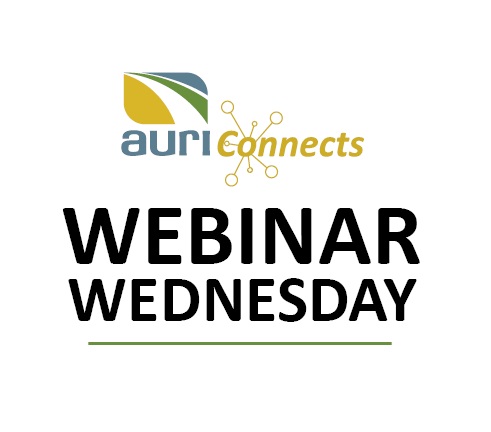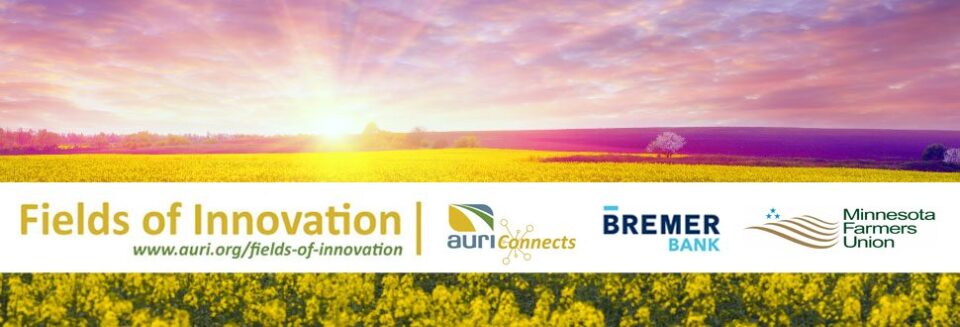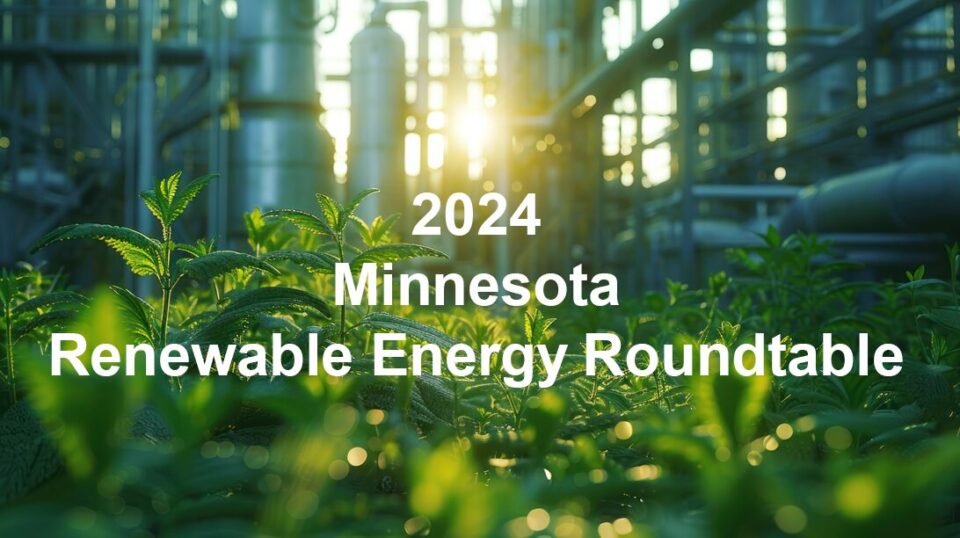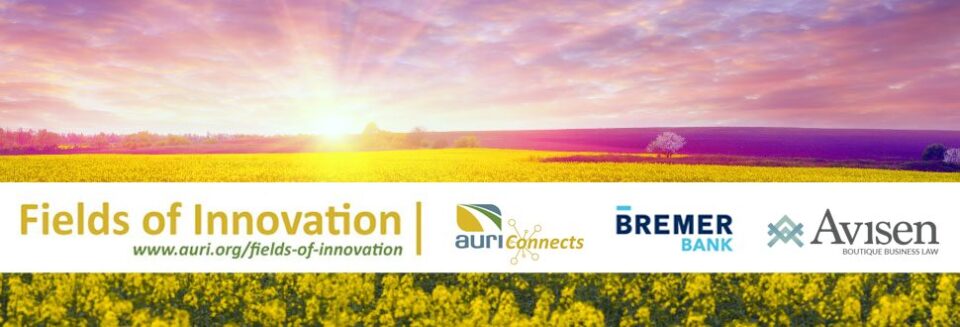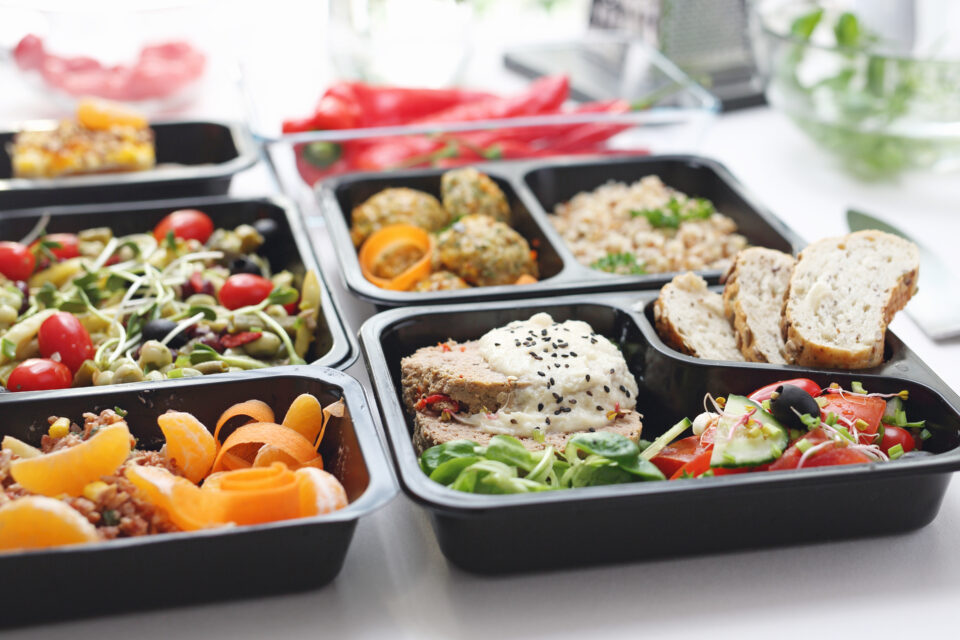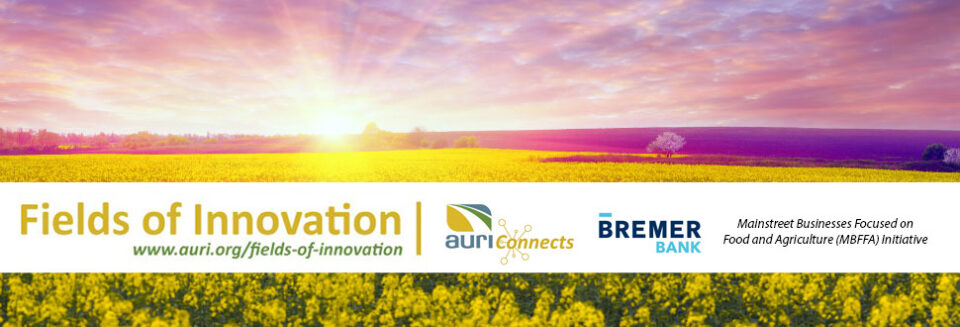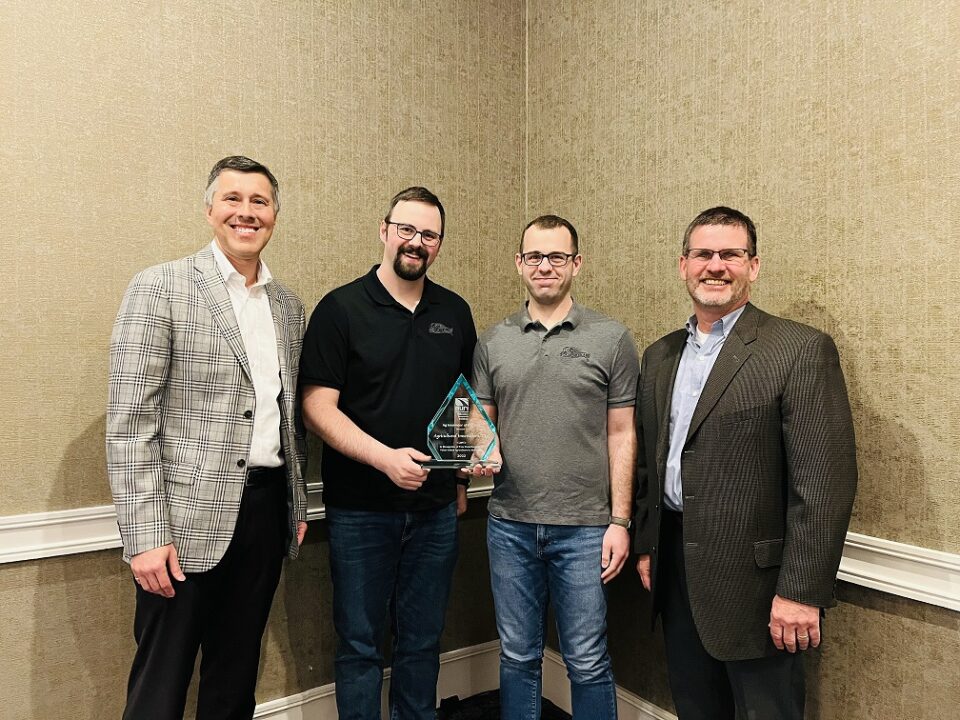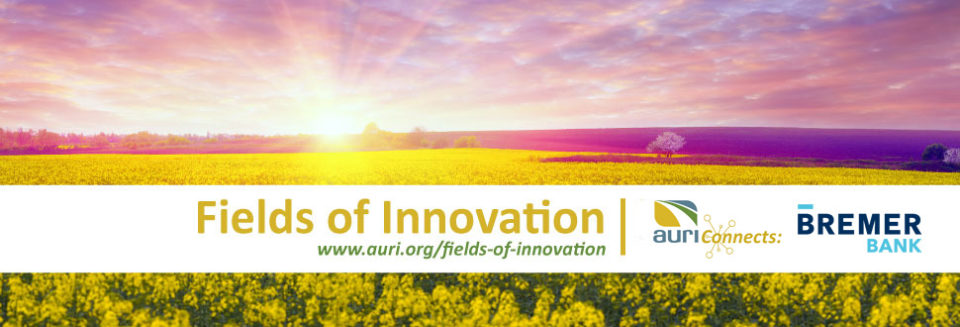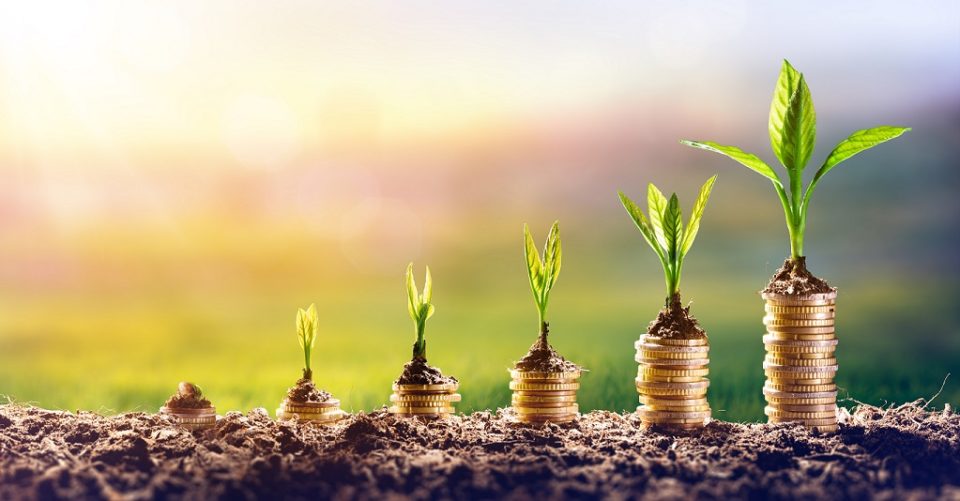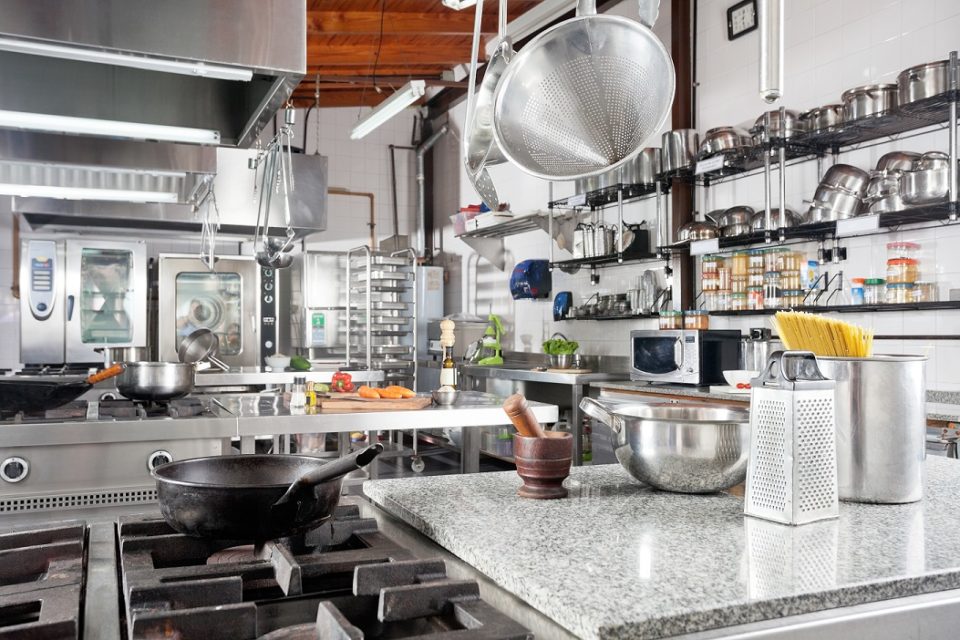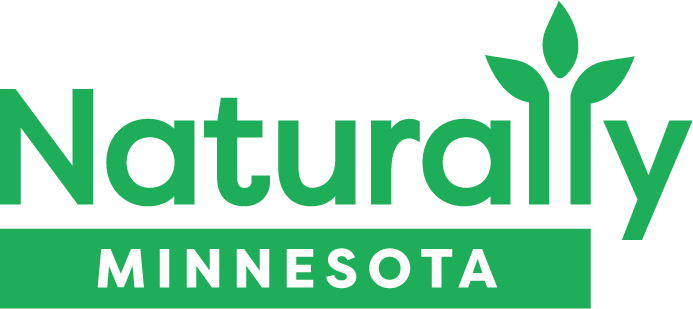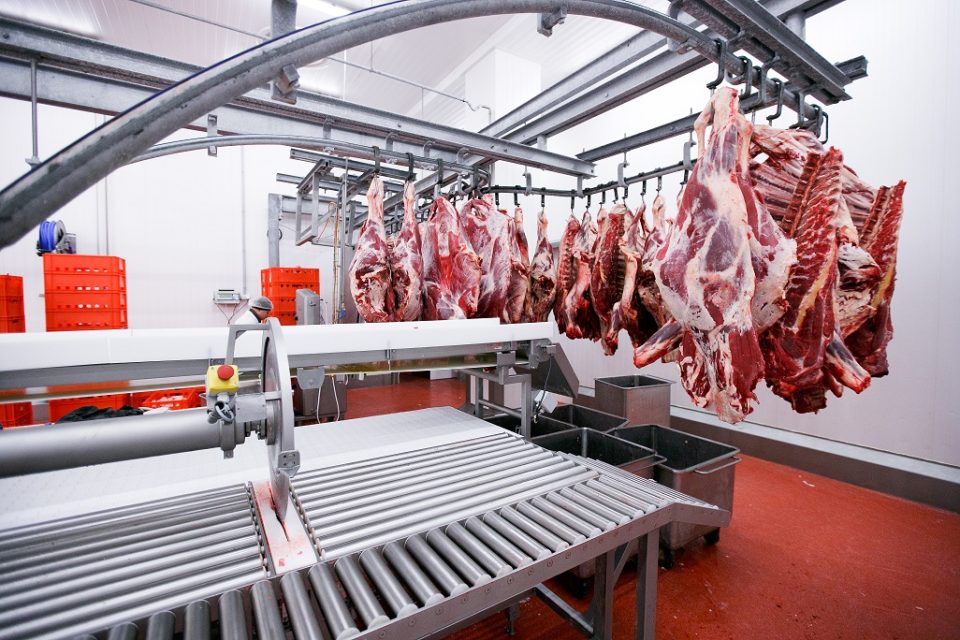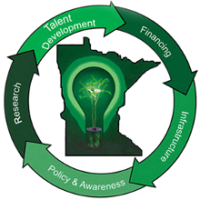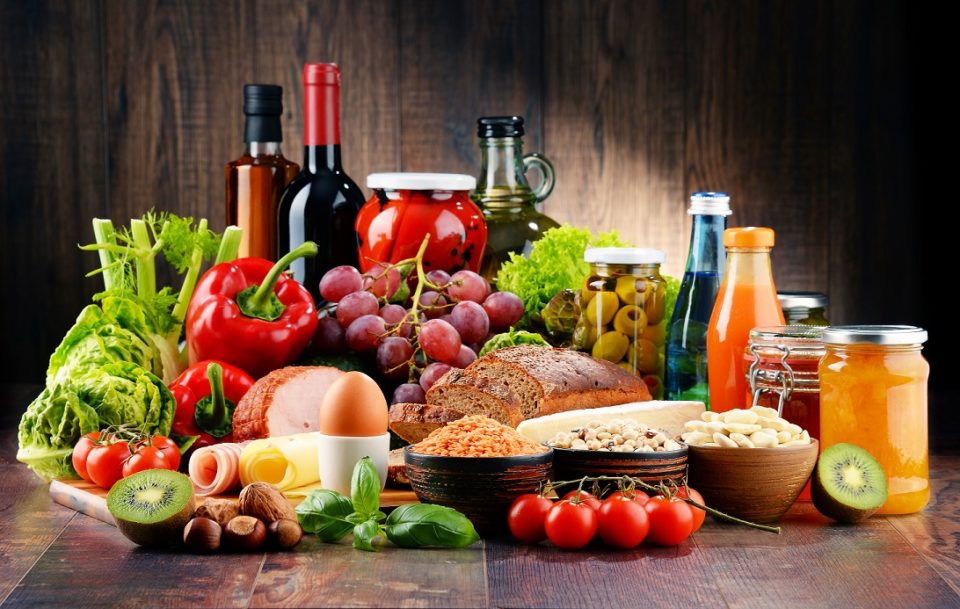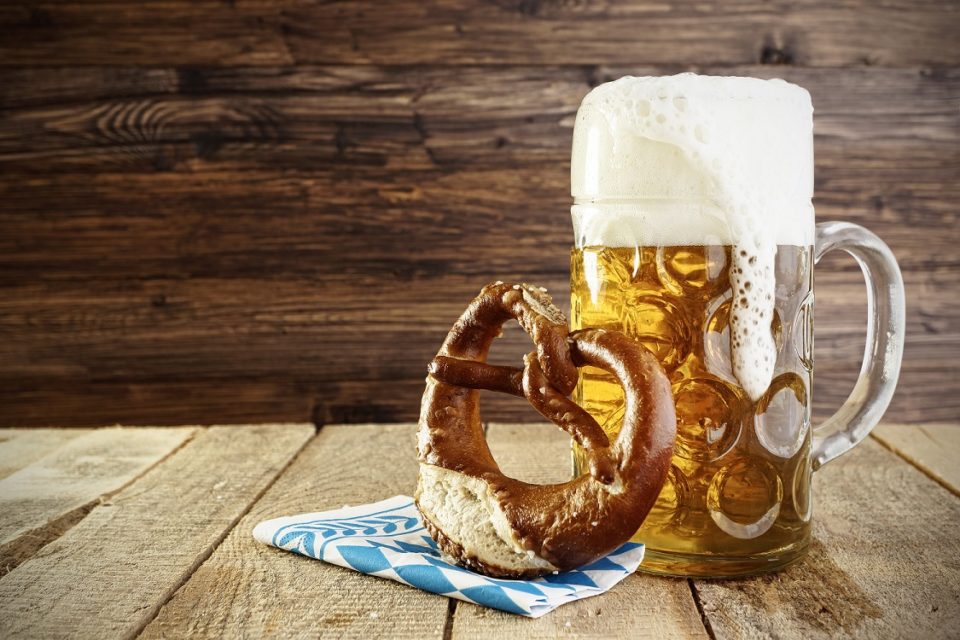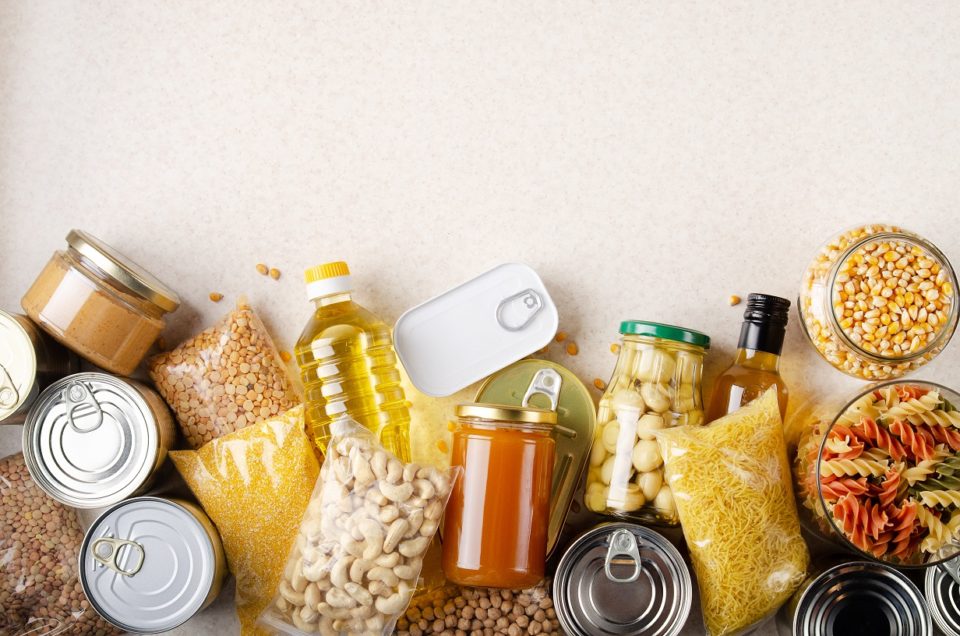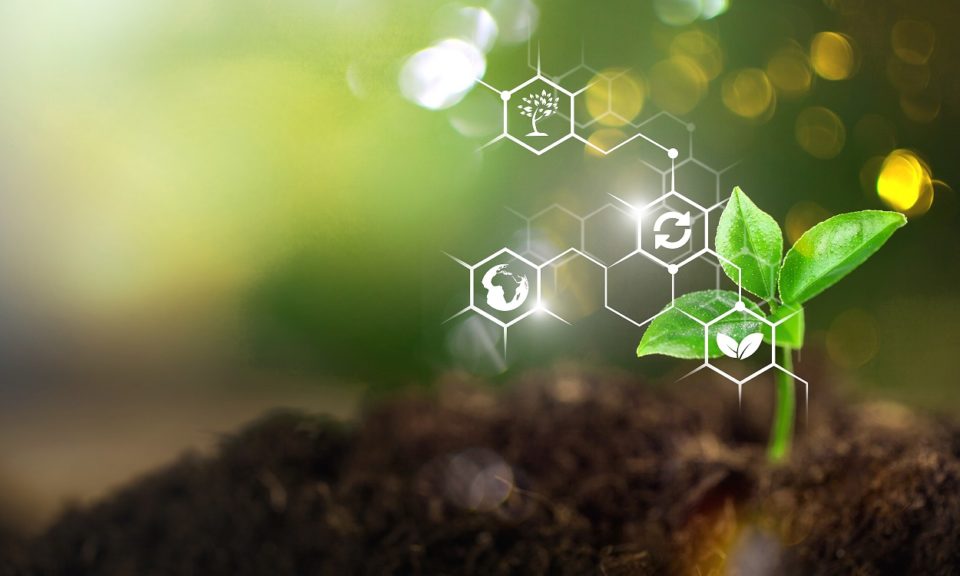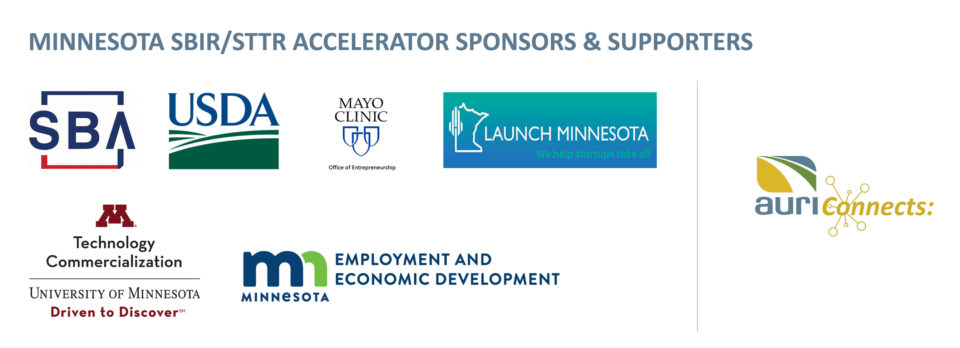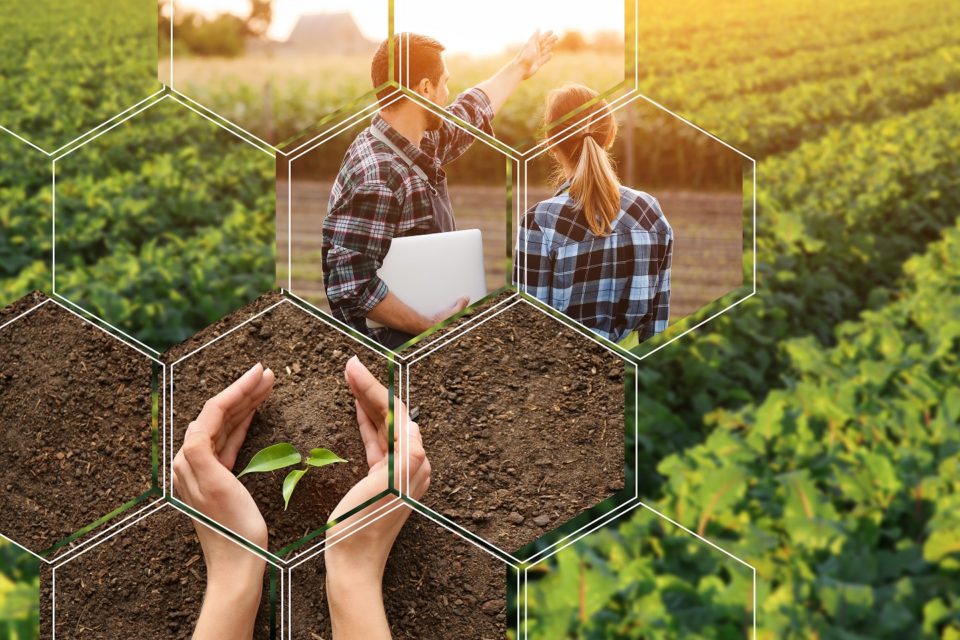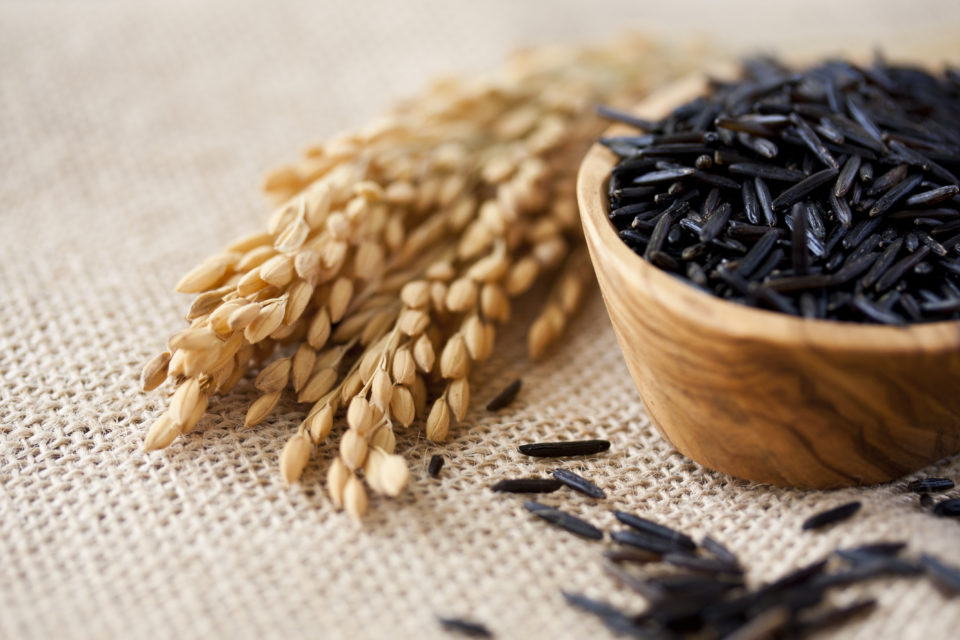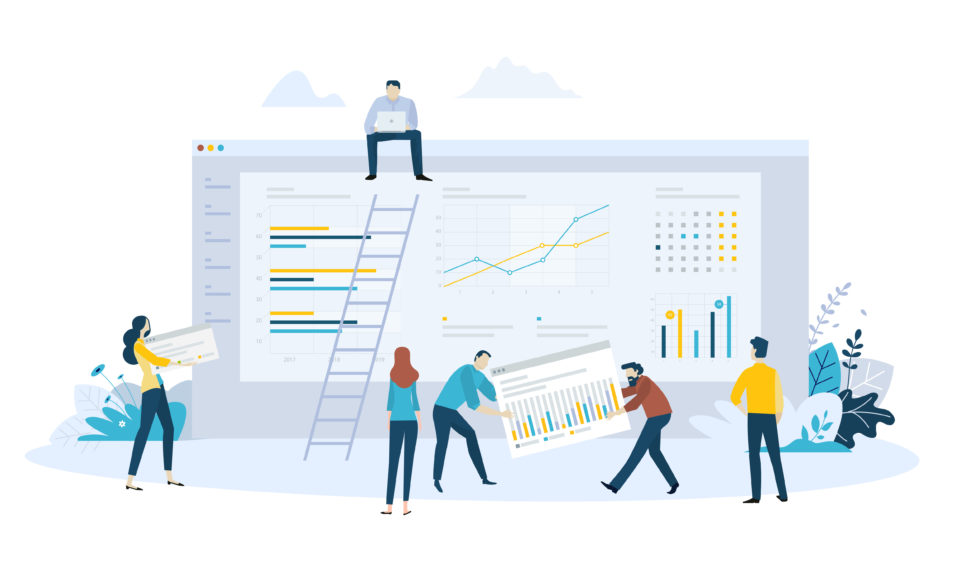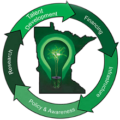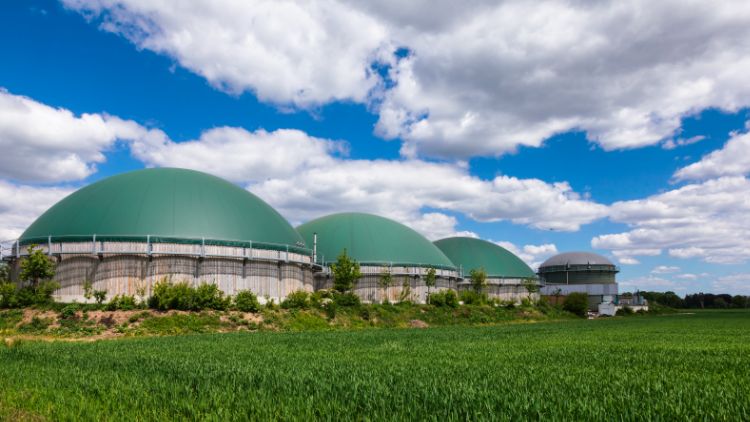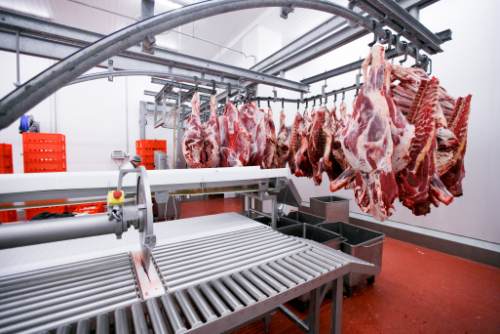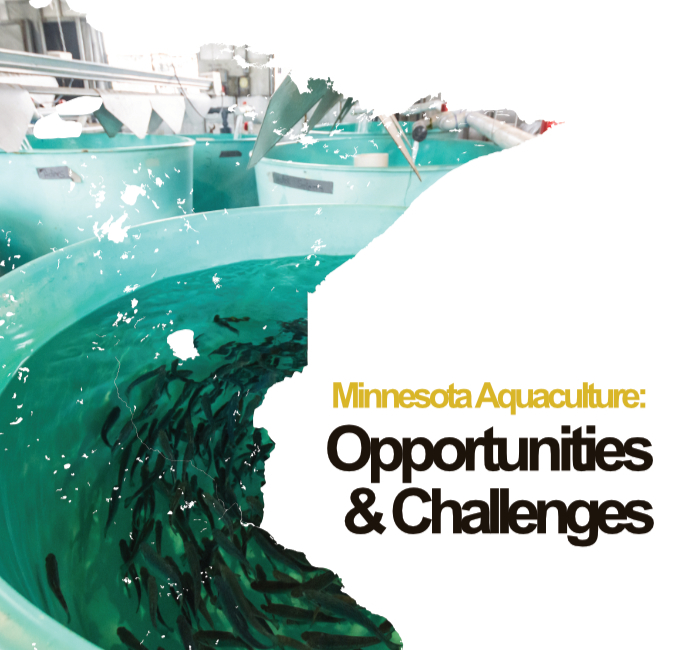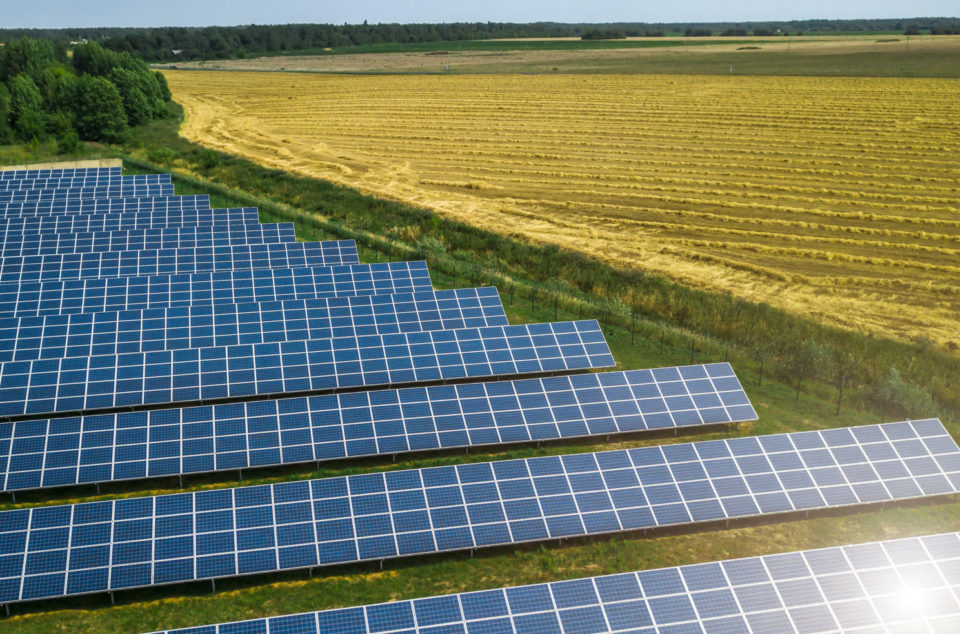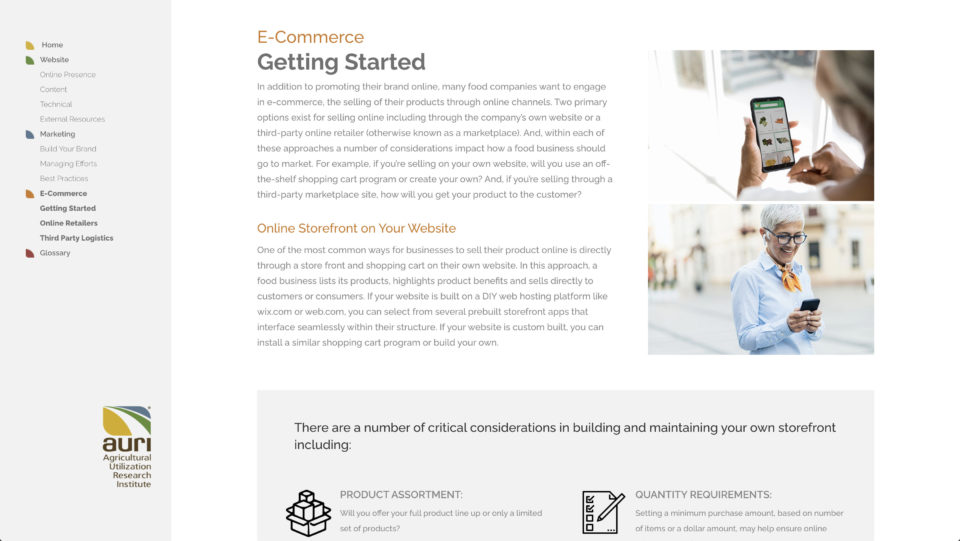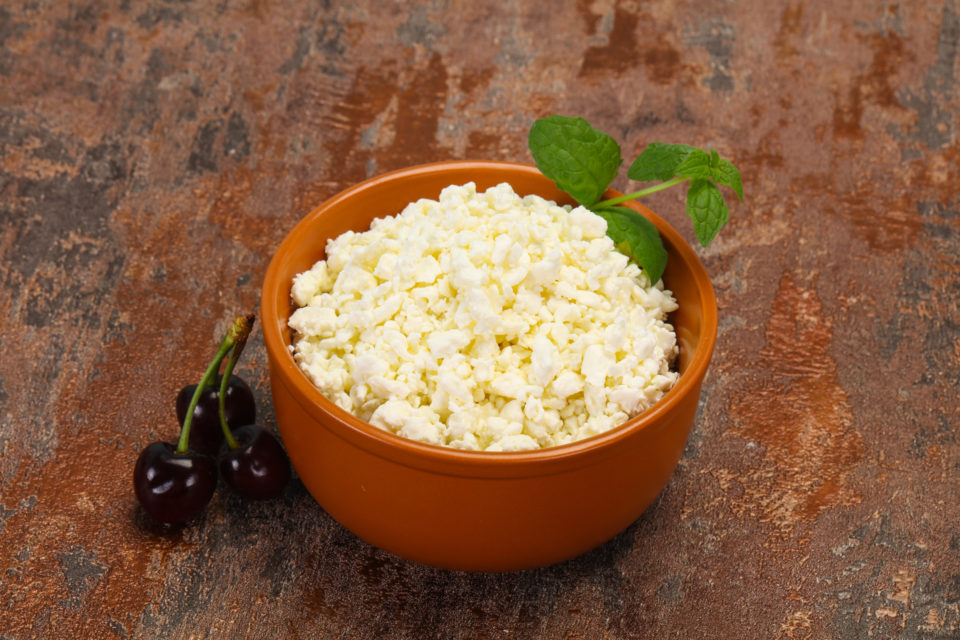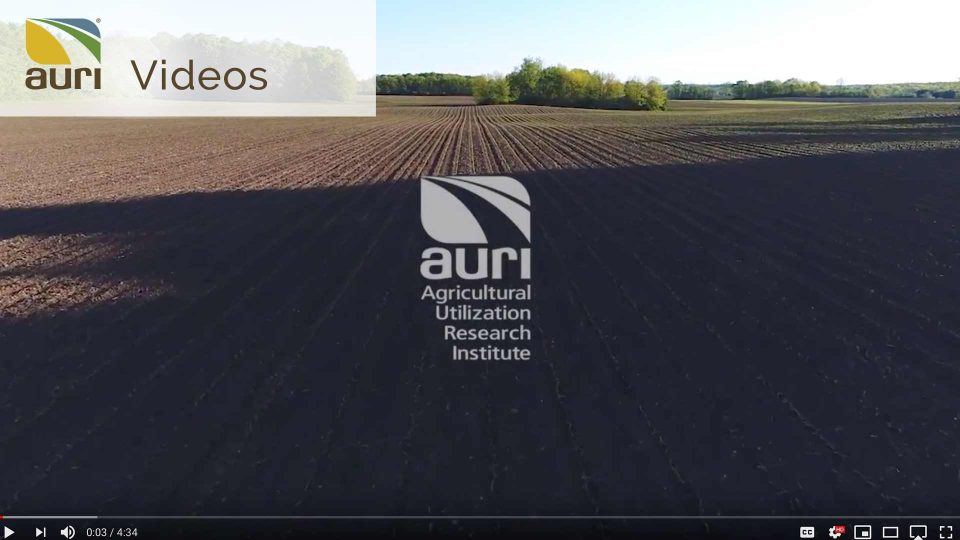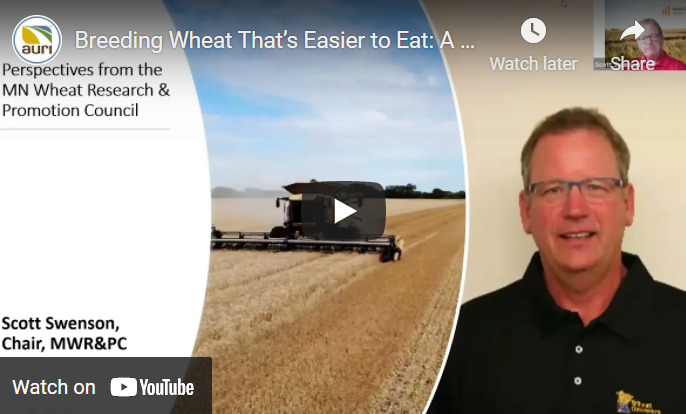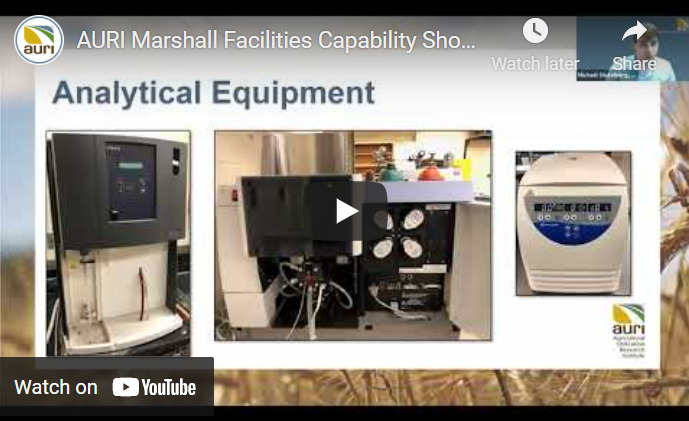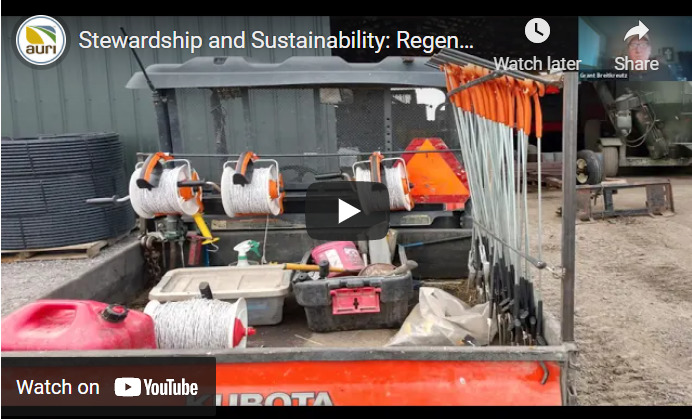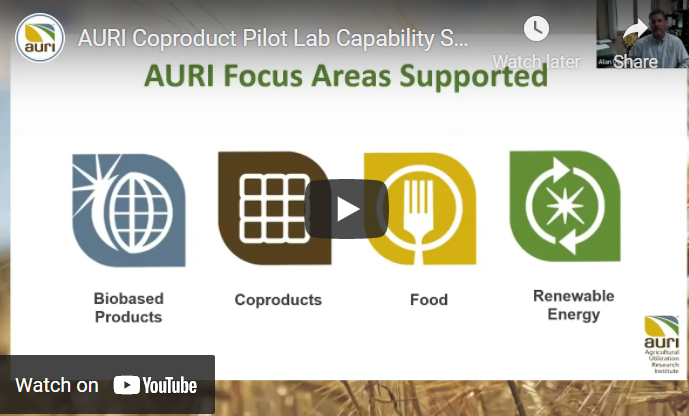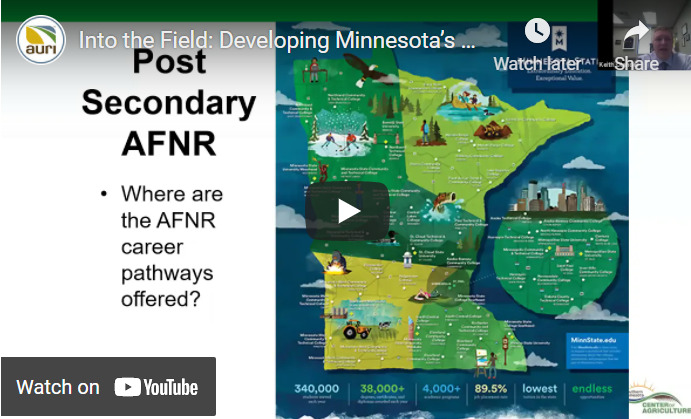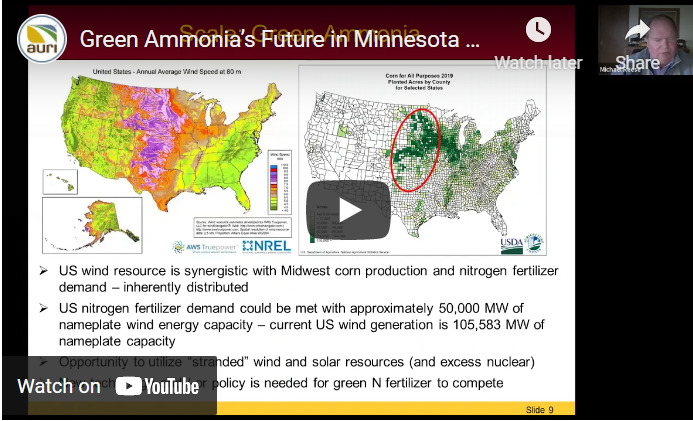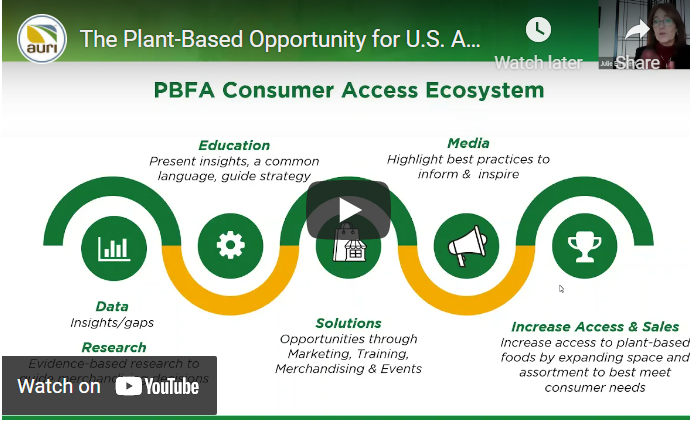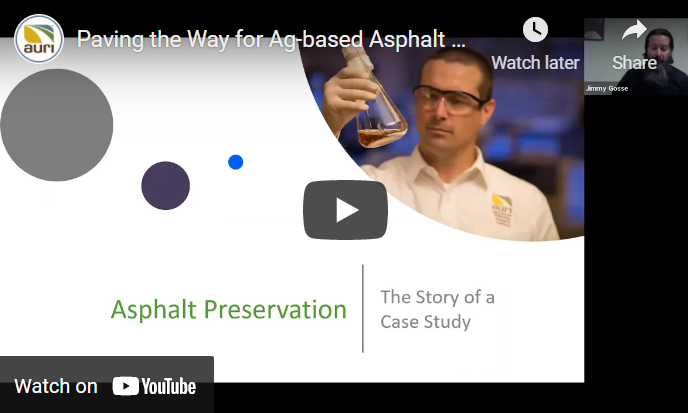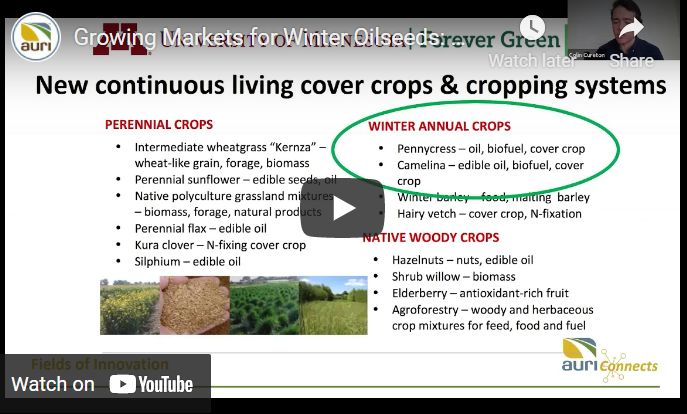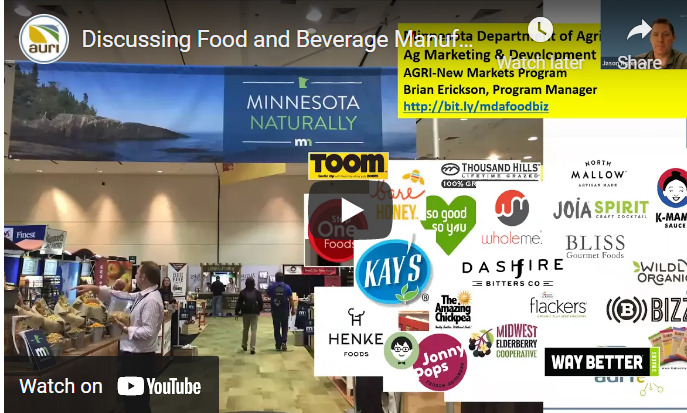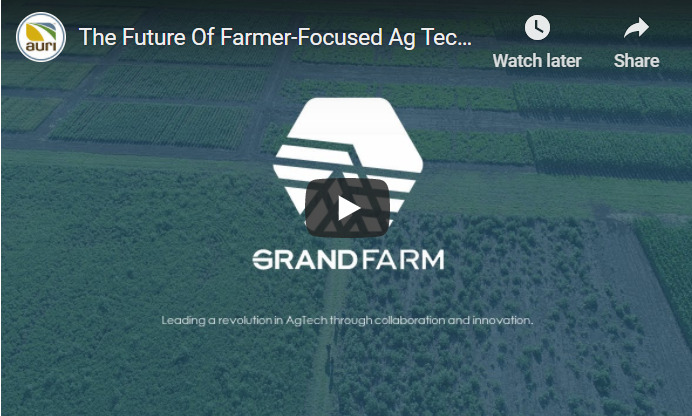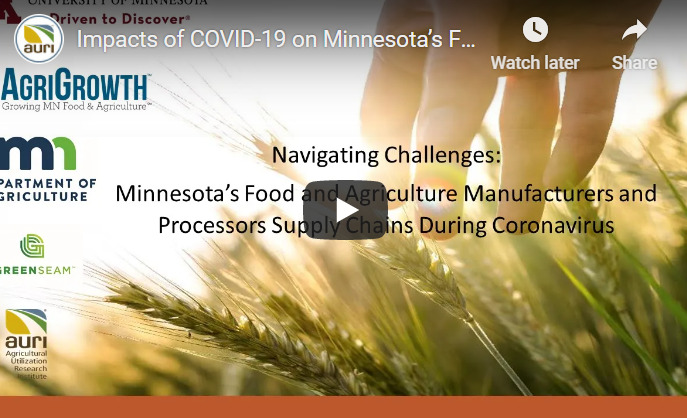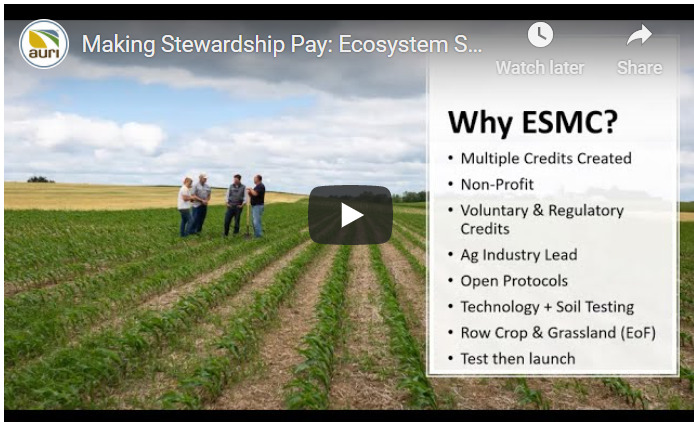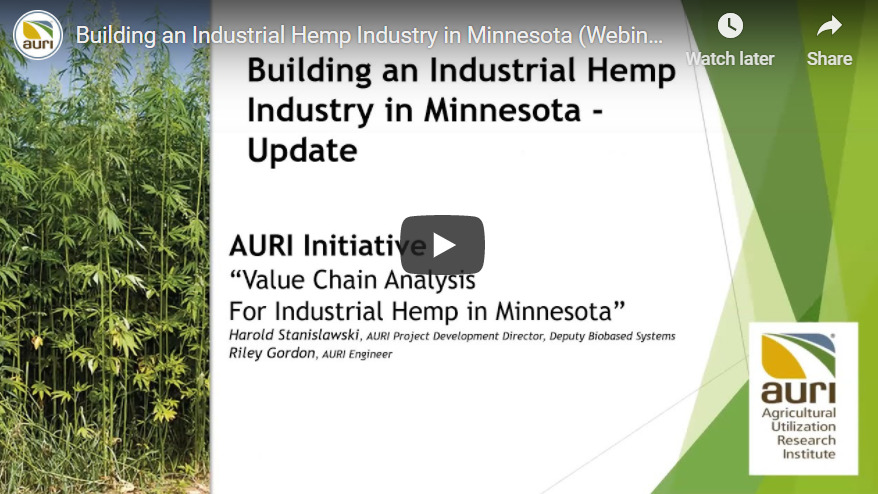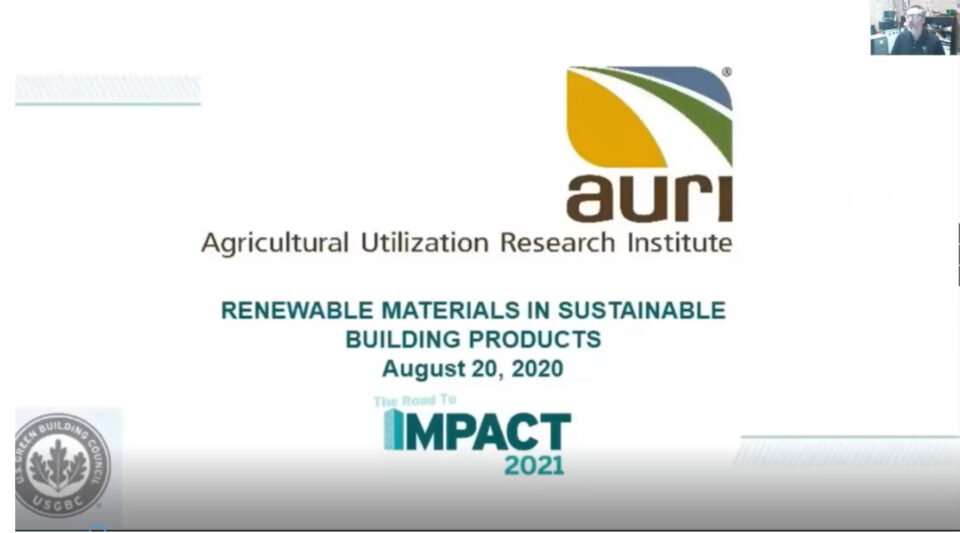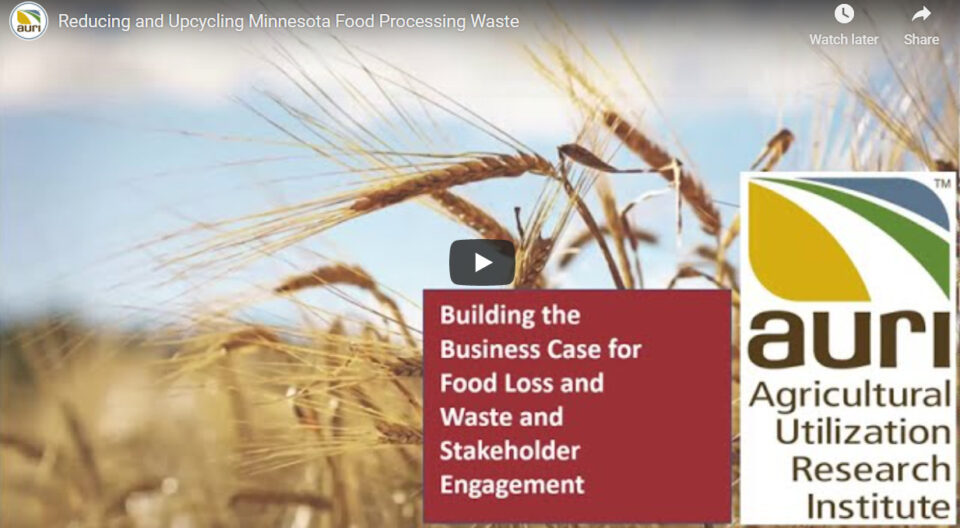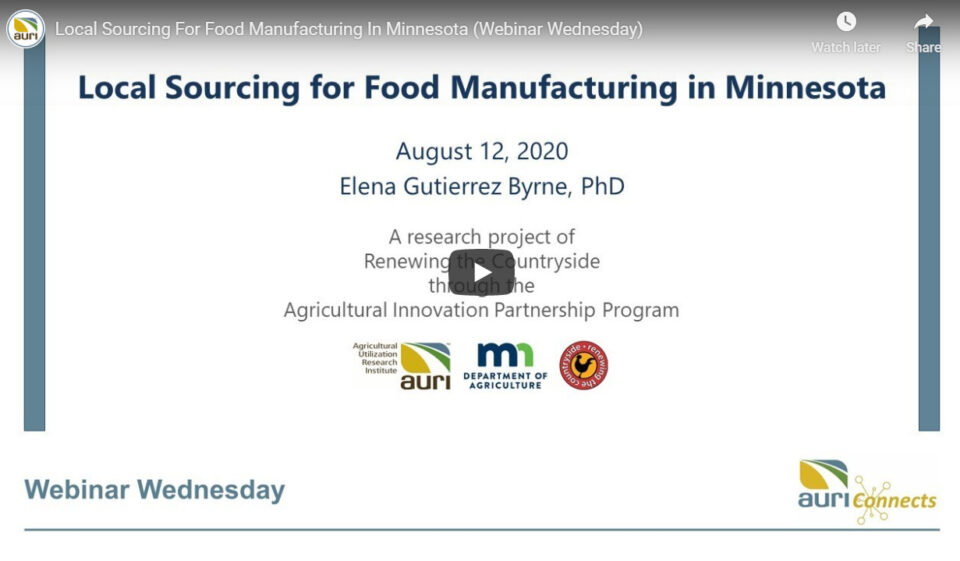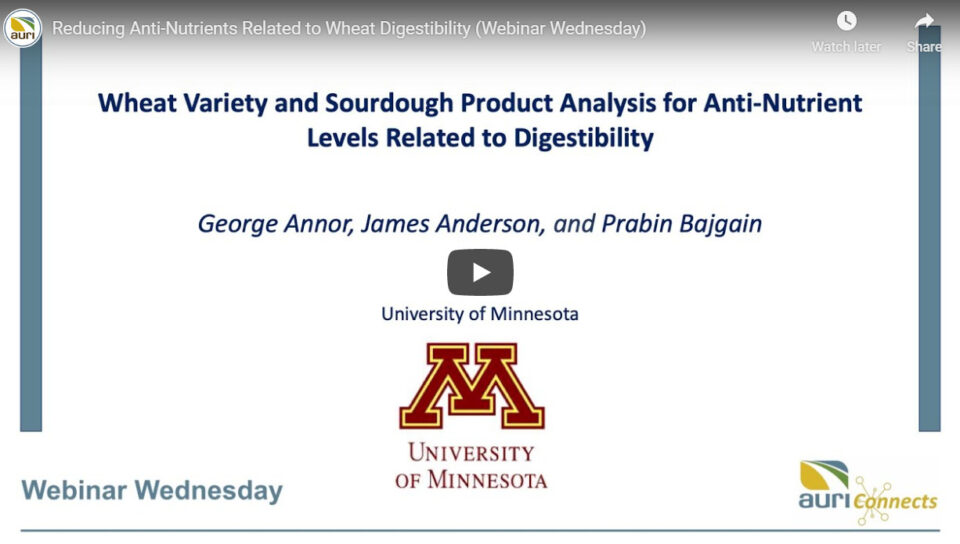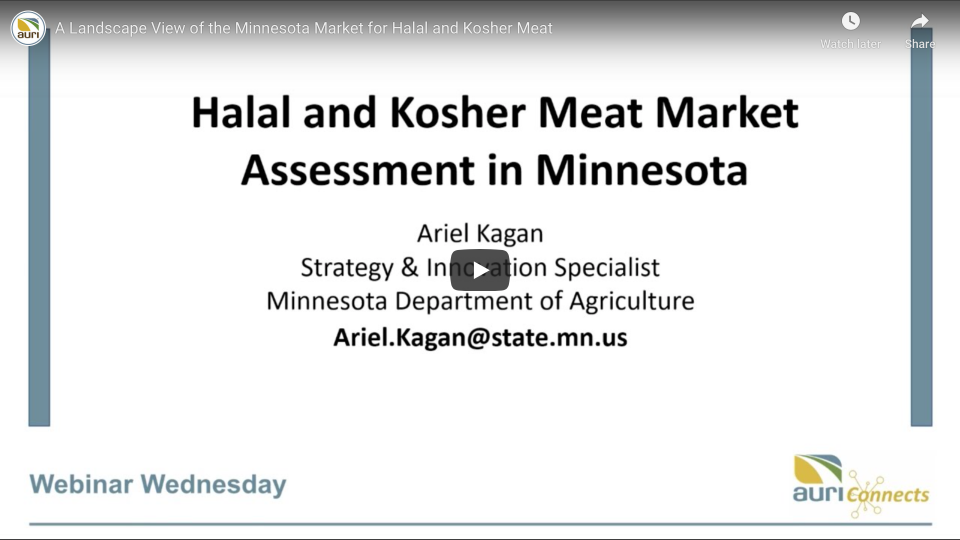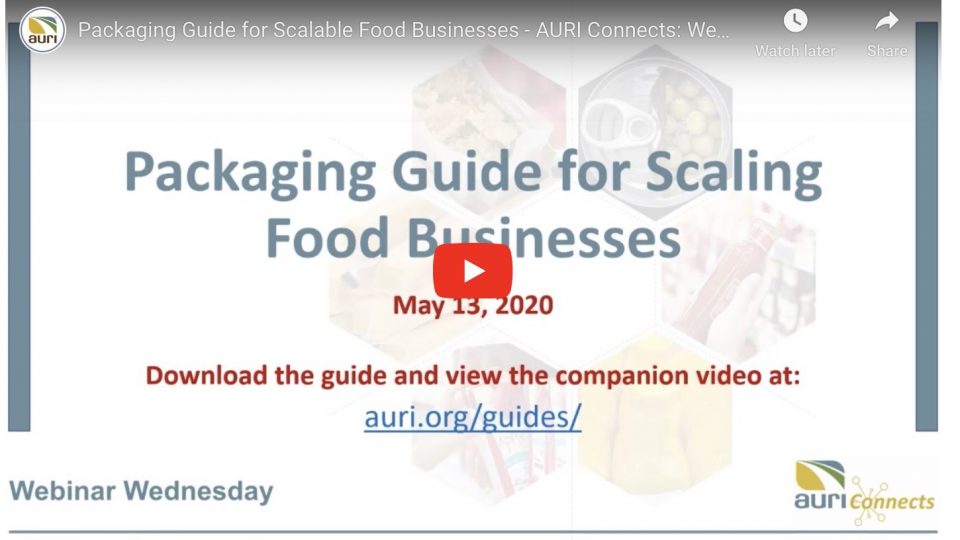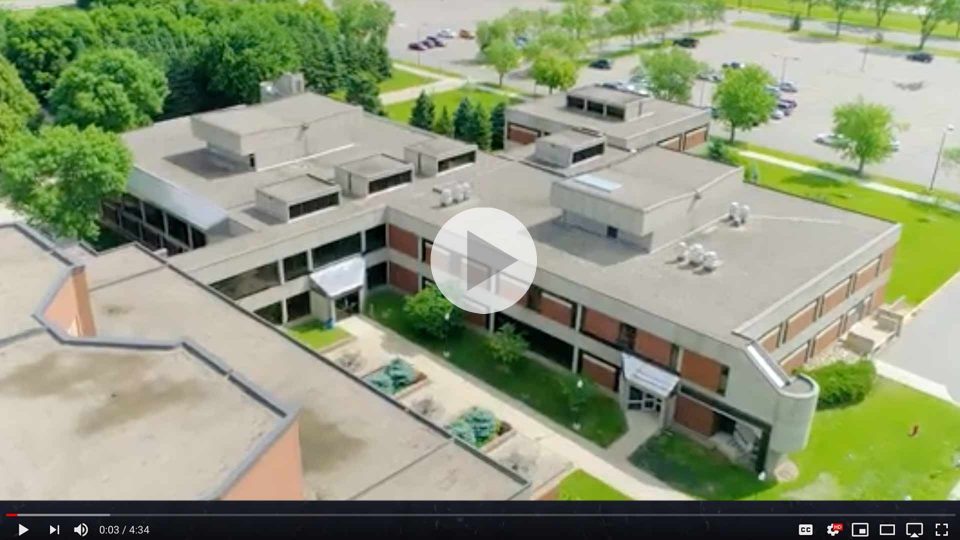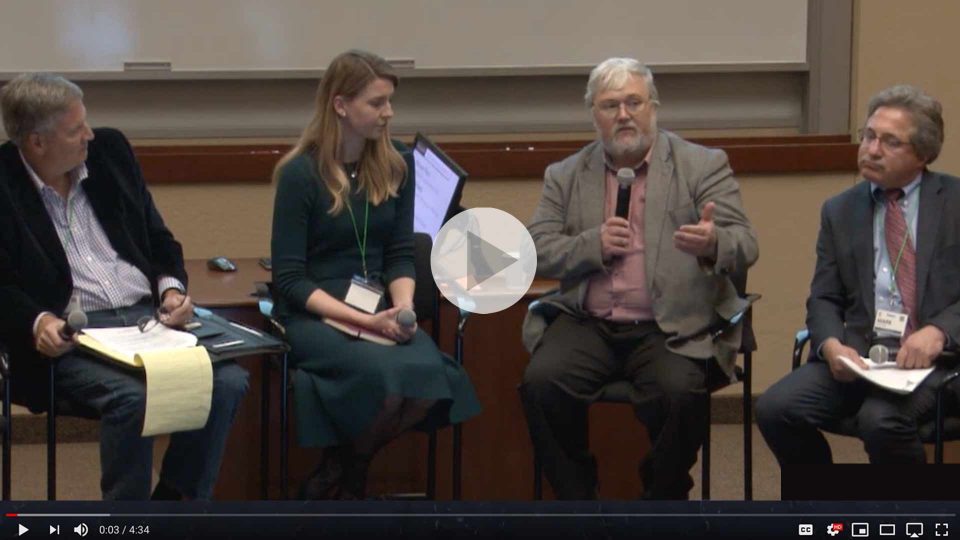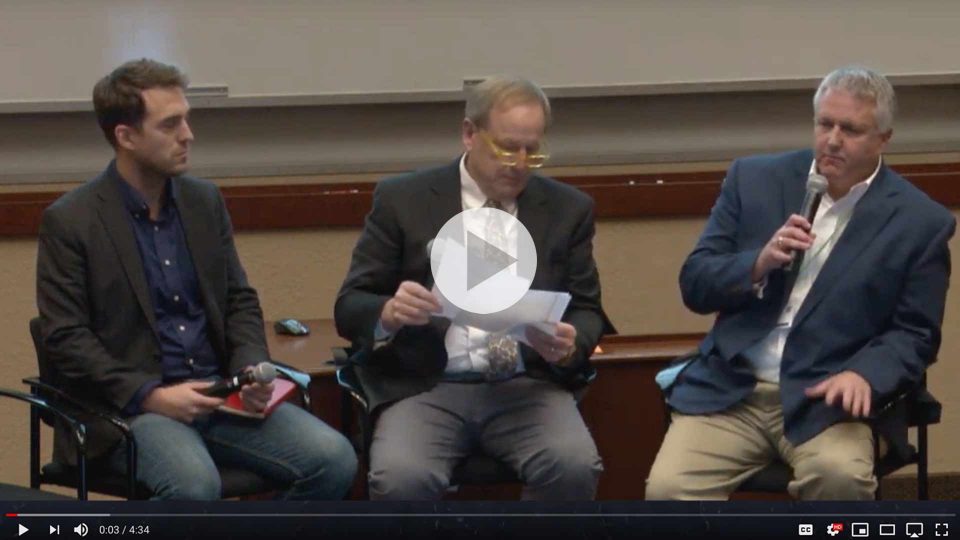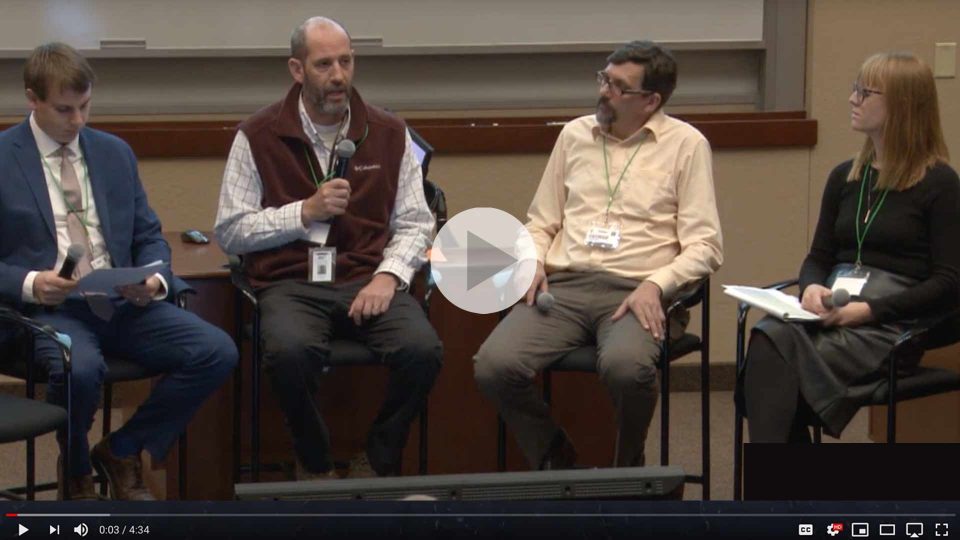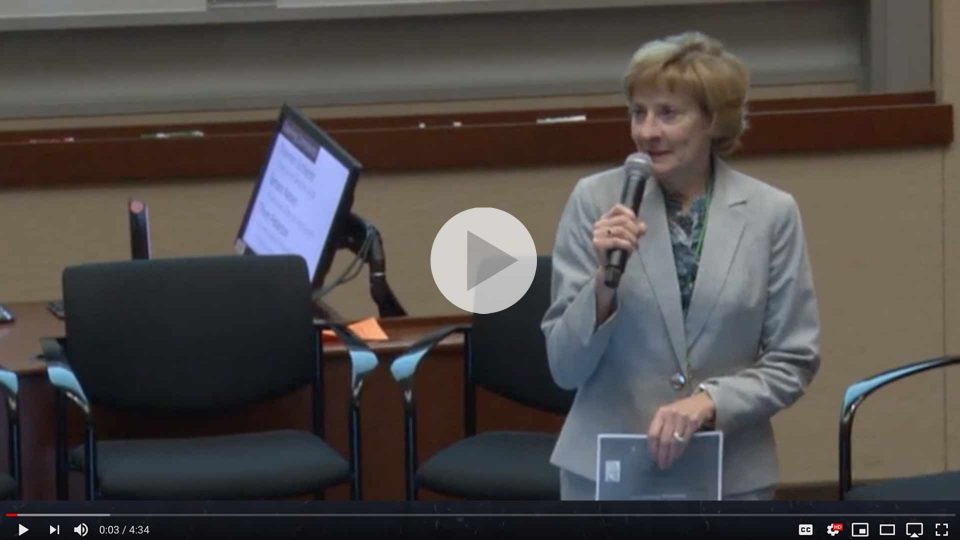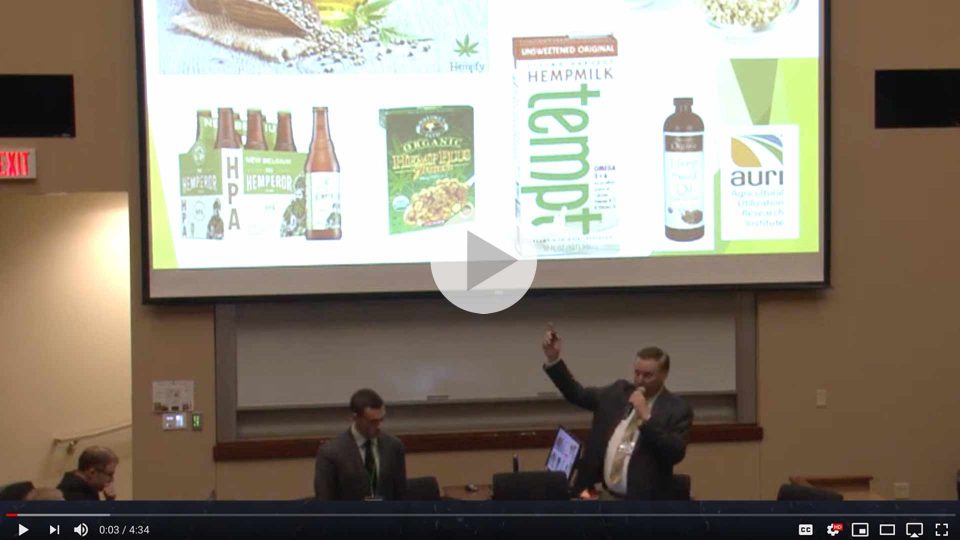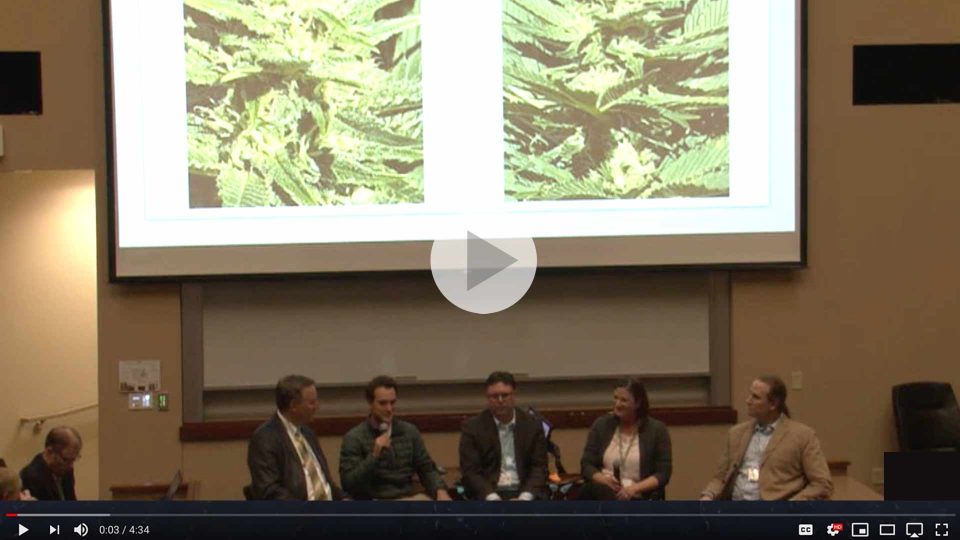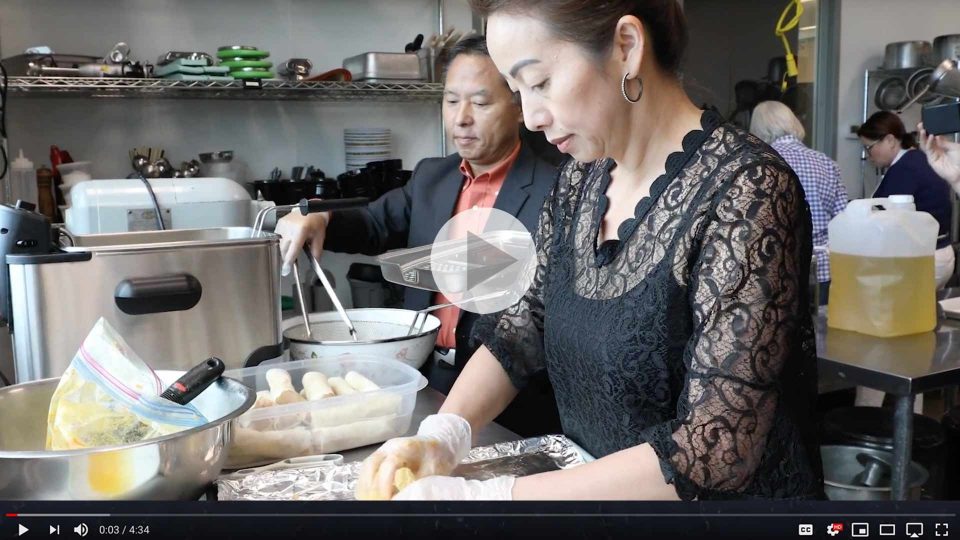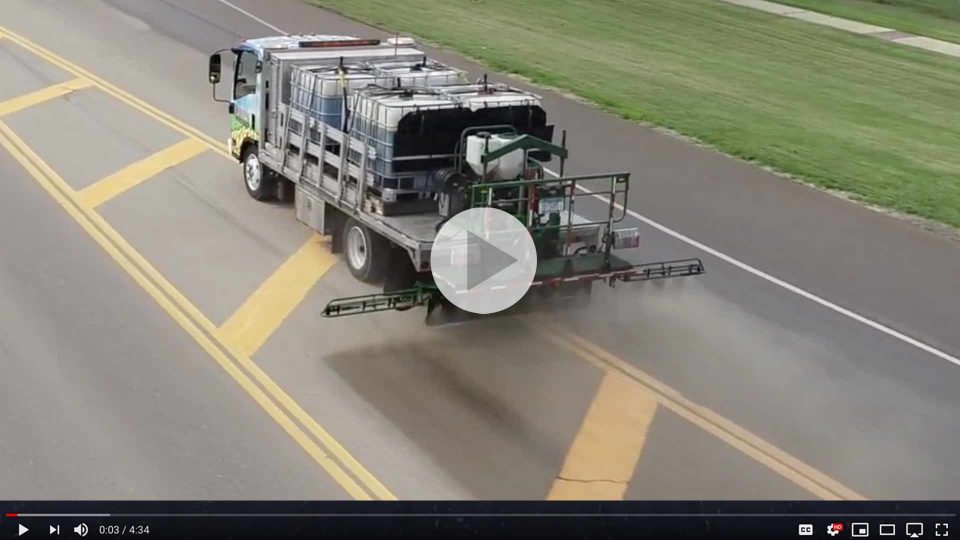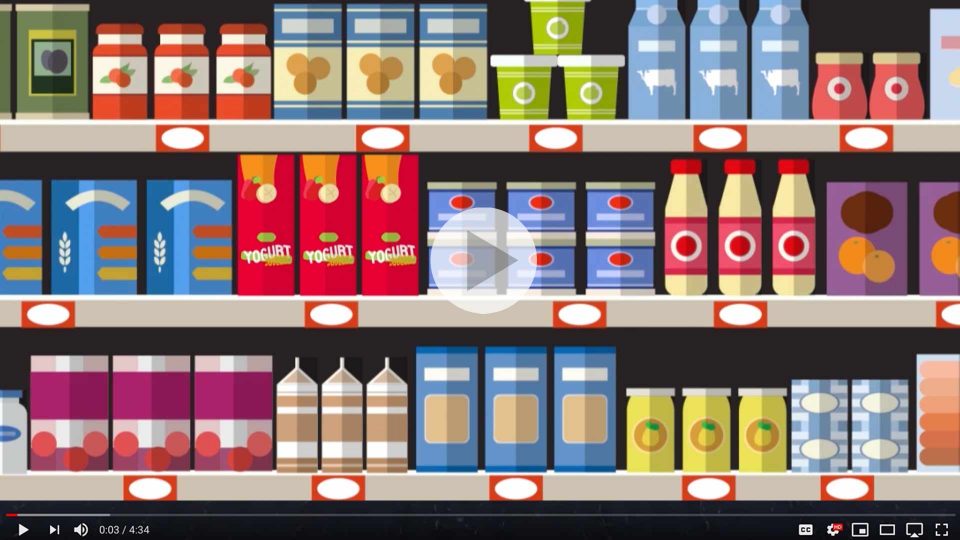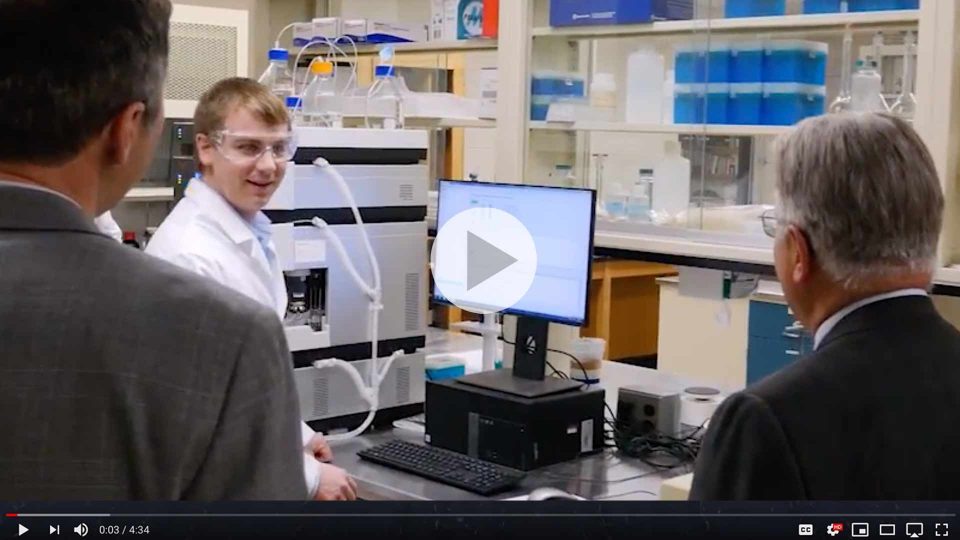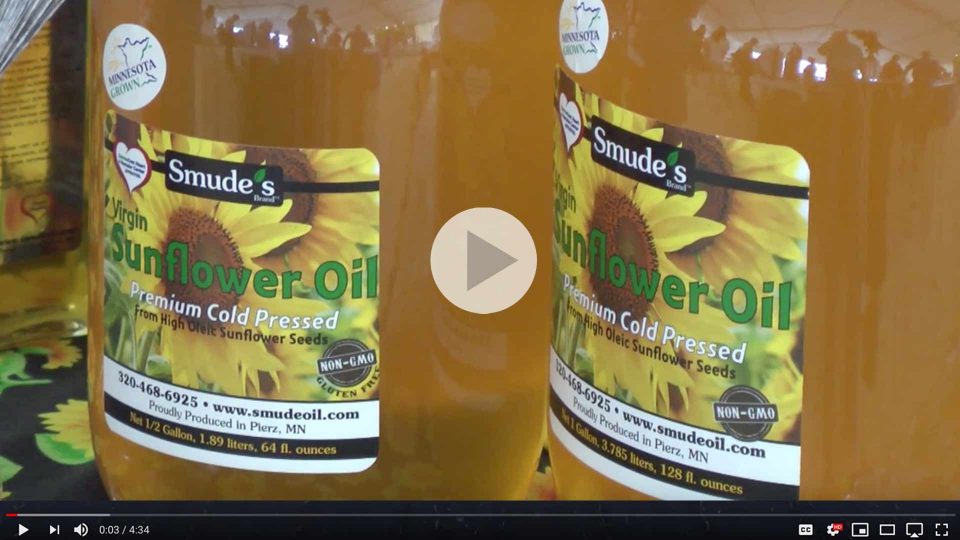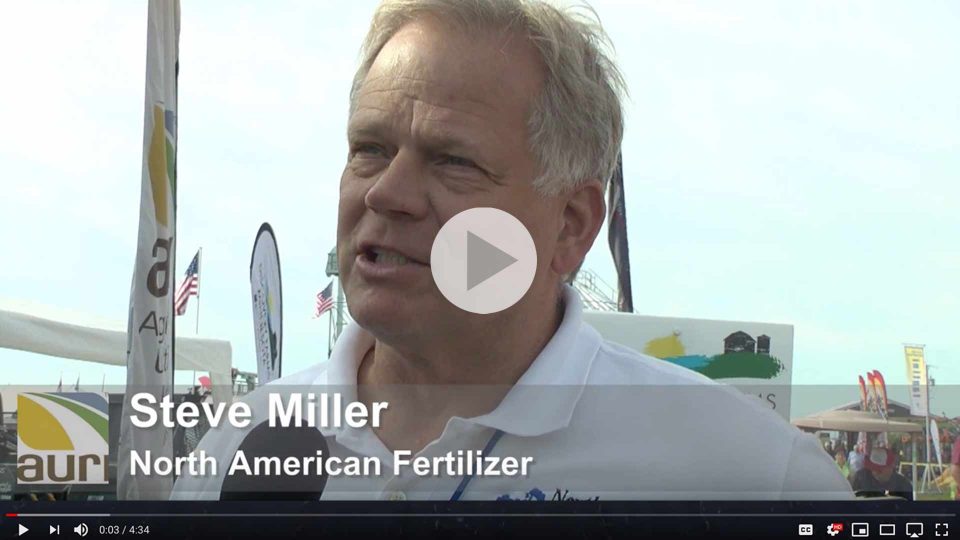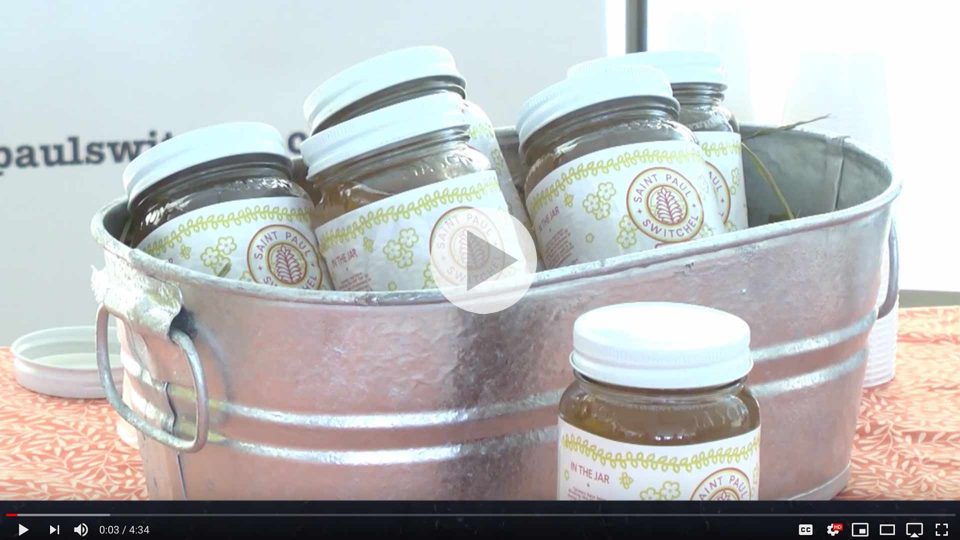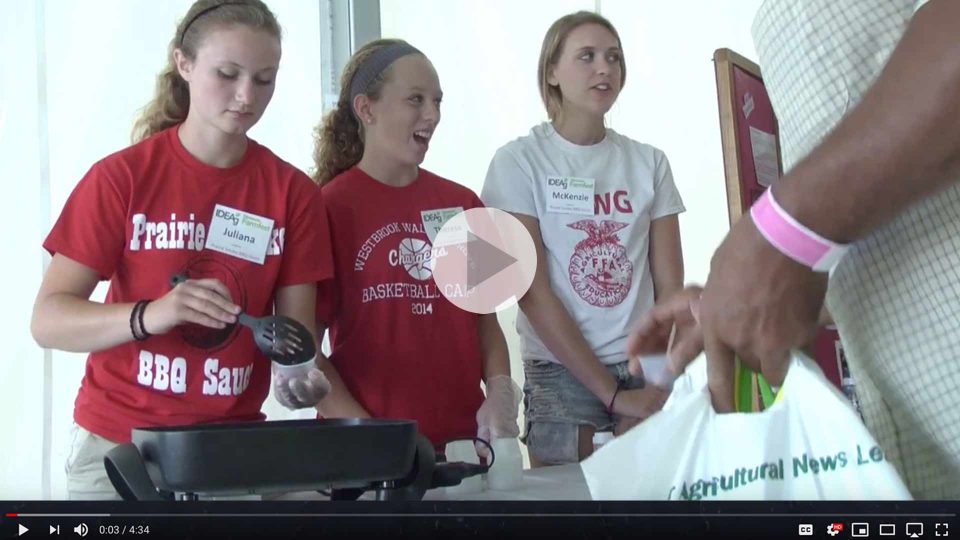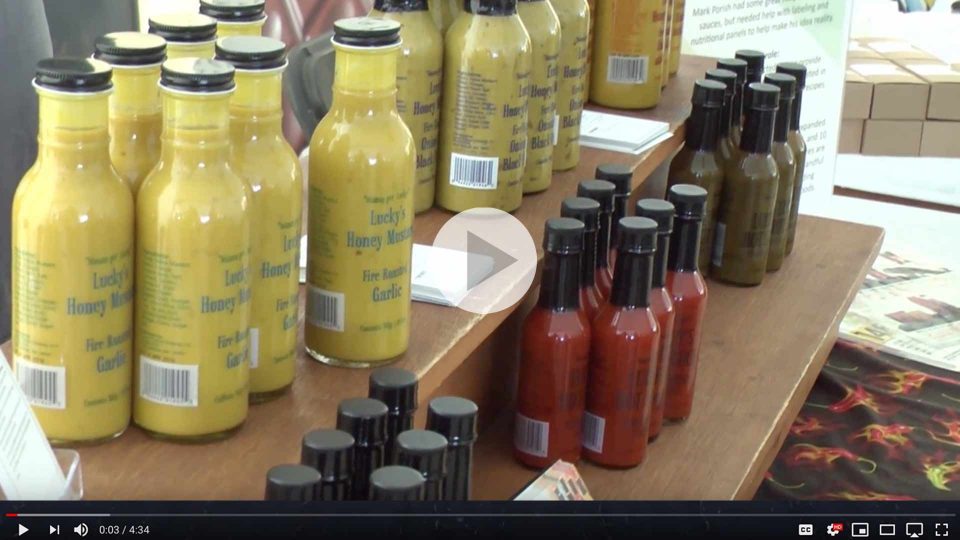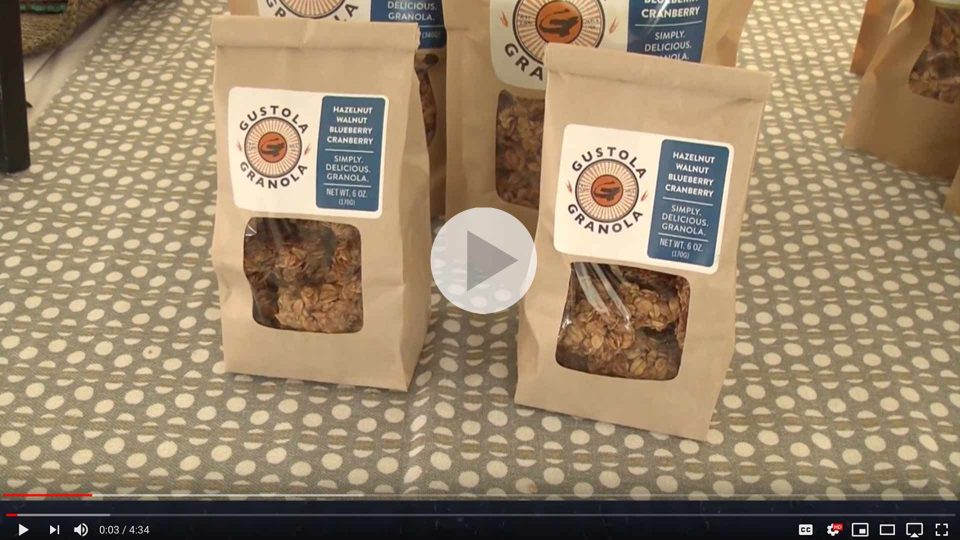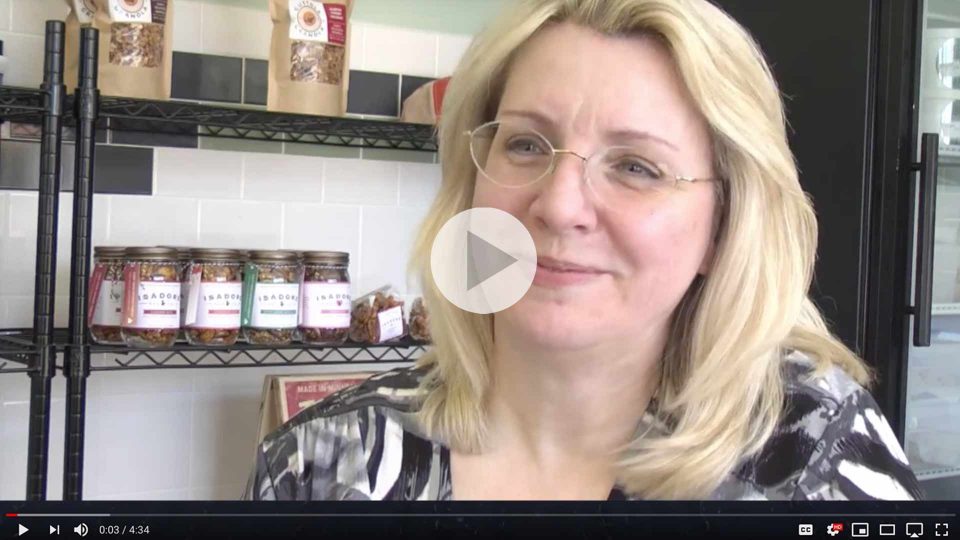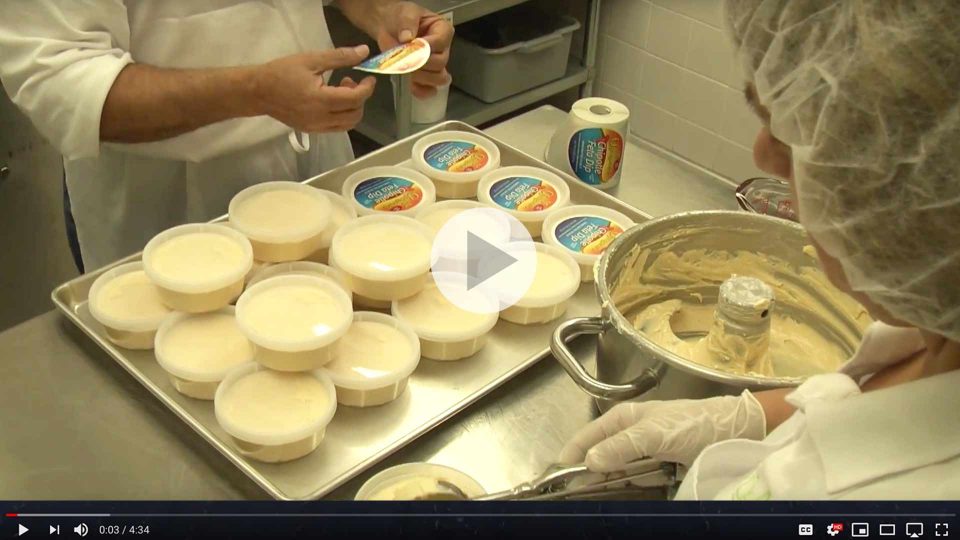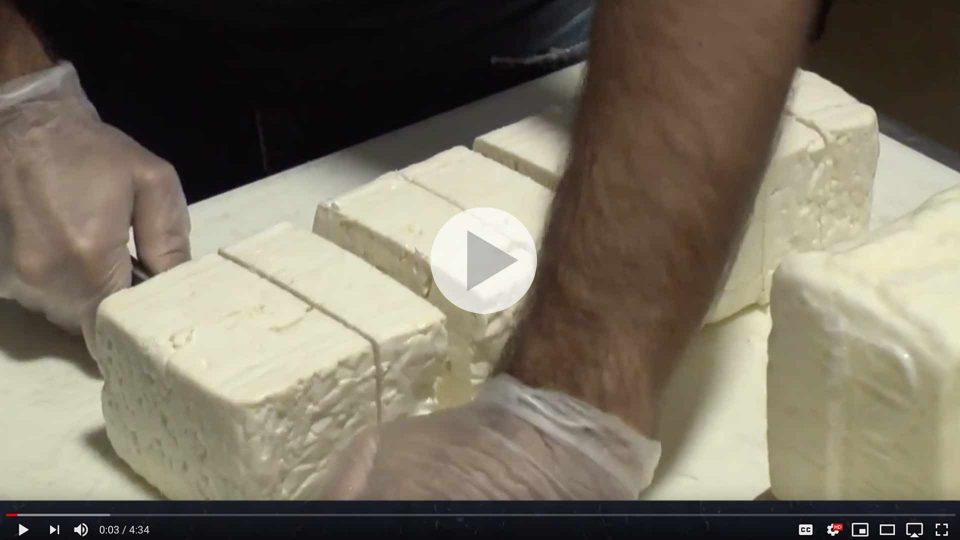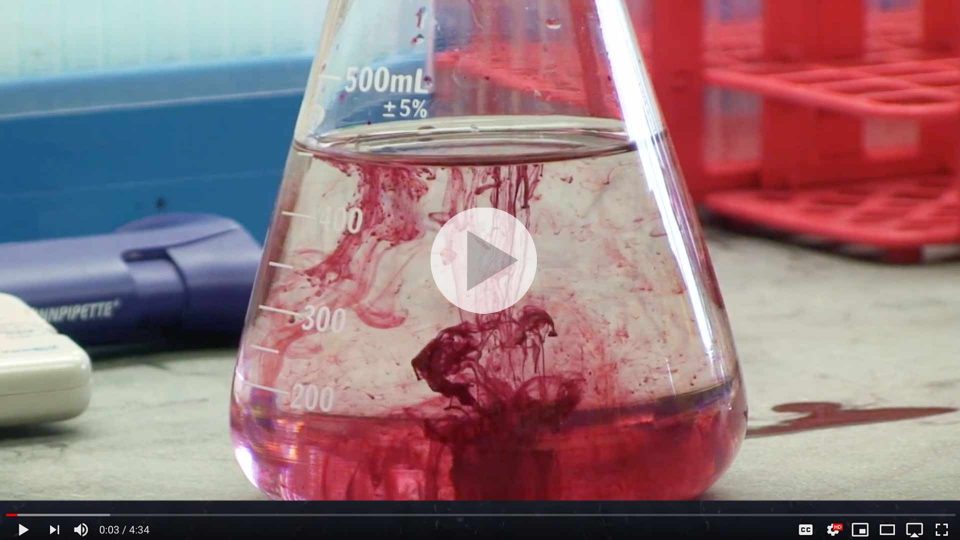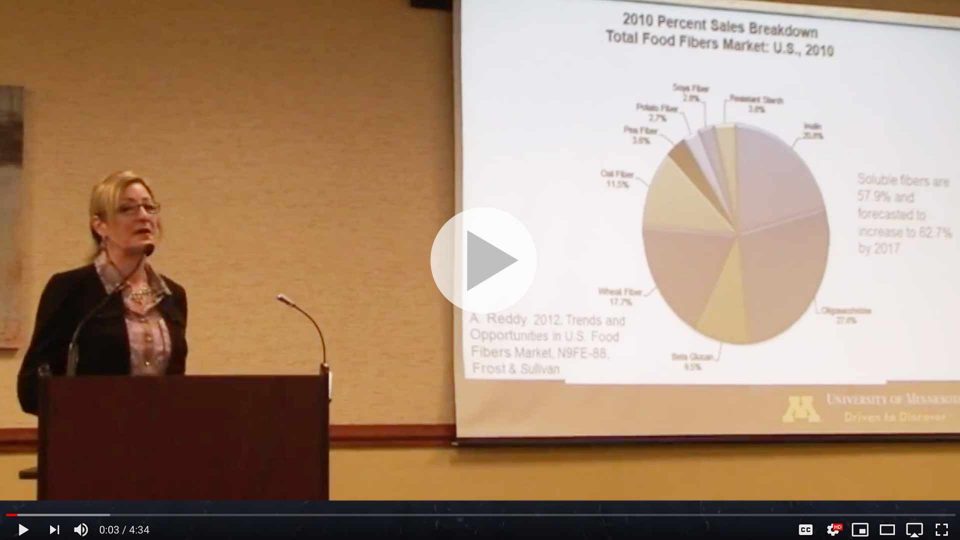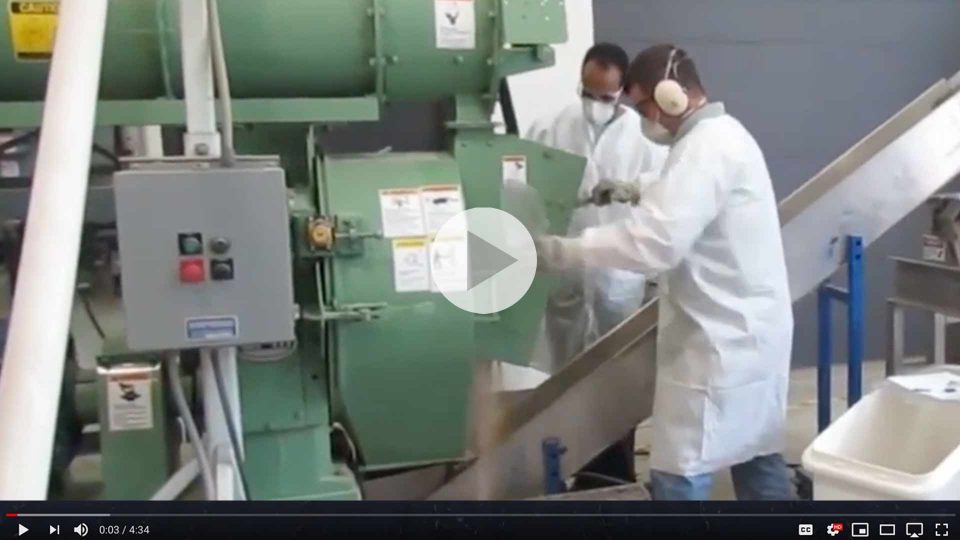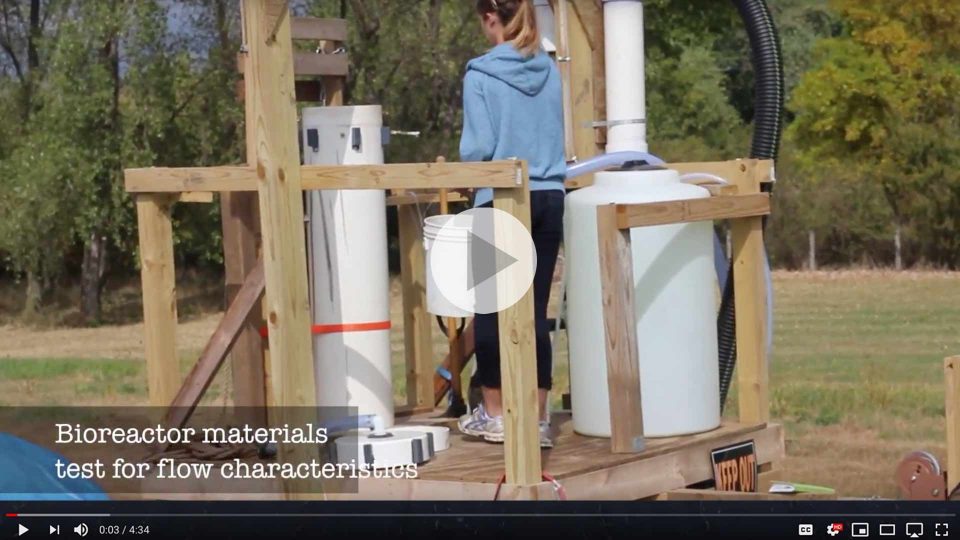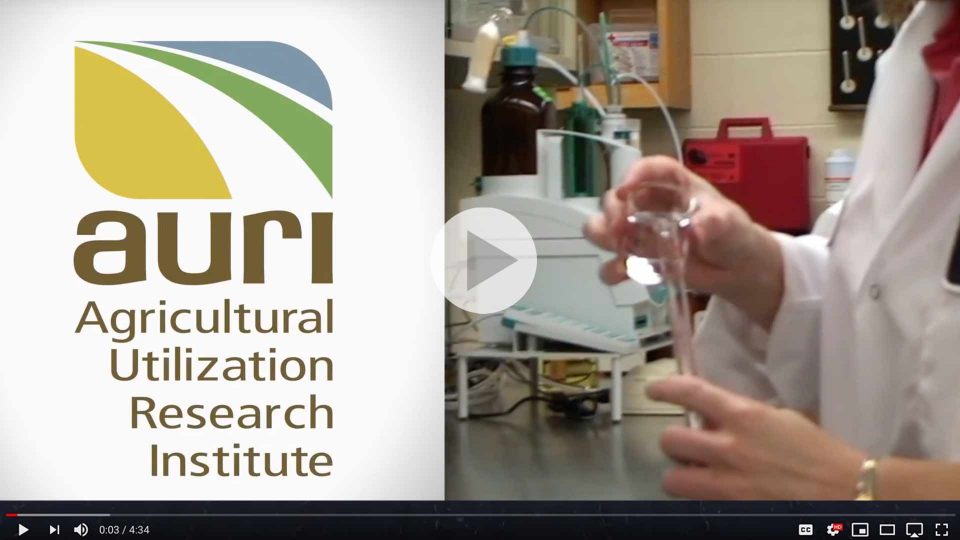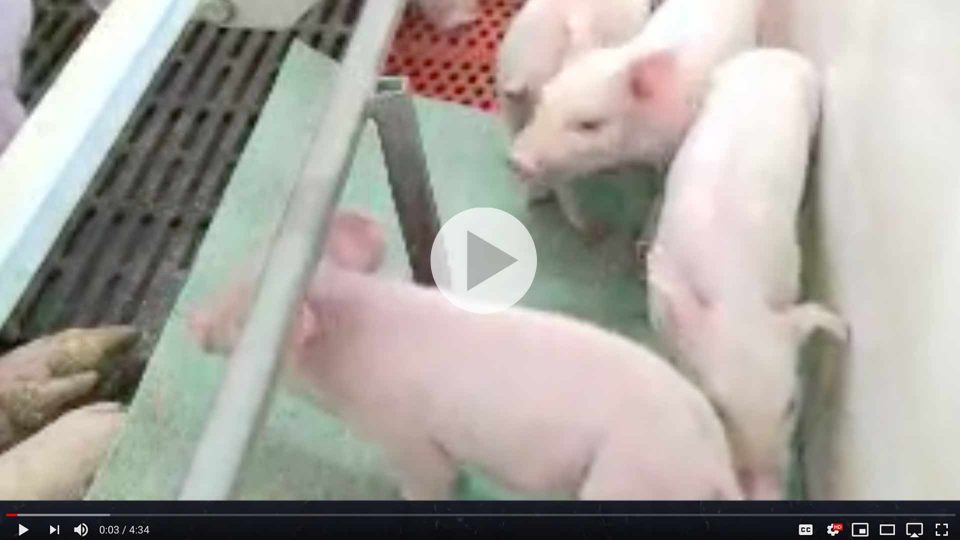This webinar showcased a new meat processor benchmarking tool developed by Christianson Benchmarking in collaboration with AURI and the USDA Agricultural Marketing Service. The tool will enable very small to small-sized meat processing businesses to compare their financial and operational performance against industry peers, highlighting their strengths and pinpointing areas for improvement. The webinar also highlights new grant opportunities from the Minnesota Department of Agriculture. This webinar was sponsored by Bremer Bank and the Minnesota Farmers Union.
Home | Videos
AURI Videos
Learn more about AURI’s innovation initiatives through these AURI video productions.
As global demand for protein continues to grow due to increasing population and consumer interest, the food and agricultural industry is evolving to meet this demand sustainably and responsibly through a combination of innovation, research, and partnerships. Minnesota is a leader in protein production and new efforts are underway to support industry transformation and scale-up possibilities across both plant and traditional protein sectors. This webinar will highlight industry trends and opportunities and share efforts underway to advance protein sustainability. This webinar is sponsored by Bremer Bank and the Minnesota Farmers Union.
This webinar provides entrepreneurs and professionals in the food and ag industry with an overview of how to bring new products and processes to market, including a discussion about financial investments, time needs, and risks involved. This webinar is sponsored by Bremer Bank and the Minnesota Farmers Union.
Theme: Exploring Energy Efficiency Opportunities for Minnesota’s Value-Added Ag/Food Processing Sector This hybrid event focused on exploring proven technologies and emerging innovations focused on improving energy efficiency for value-added processing.
This webinar is the 4th in a four-part series on climate change opportunities for value-added agriculture. This webinar focuses on effective processing and management practices of nitrogen and provides an overview of current developments in the area of decarbonization of synthetic nitrogen and efficient use of recycled nitrogen. This webinar is sponsored by Bremer Bank and Avisen Legal.
Water conservation is critical in agriculture as it directly affects food security and ecosystem sustainability. Agriculture accounts for the majority of global freshwater withdrawals, making it the largest user of water resources. Efficient water use ensures a thriving agricultural sector while preserving natural ecosystems. Adopting water efficiencies in agriculture is a matter of sustainability and economic resiliency for rural economies. This is especially vital in regions where water scarcity is a current or emerging issue. Water conservation is equally vital in agricultural commodity processing as the sector requires substantial water inputs. Considerable energy inputs often accompany water use
Minnesota’s value-added agricultural industry is well-equipped to adapt to a changing climate, with an increased focus on climate resiliency and reducing carbon intensity. Among the emerging opportunities is the productive use of carbon dioxide (CO2) obtained from biological processes associated with agriculture, such as ethanol fermentation or anaerobic digestion. This webinar was sponsored by Bremer Bank and Avisen Legal.
Minnesota’s value-added agricultural industry is well-equipped to adapt to a changing climate and the increased focus on climate resiliency and lowering carbon intensity. Part one of this webinar series sets the stage by featuring a Climatologist and industry experts providing insights into the link between climate, the economy, and decision-making for value-added ag businesses. This webinar was sponsored by Bremer Bank and Avisen Legal.
This webinar is part 3 of a three-part virtual ag innovation series focused on supply chain development for novel and specialty crops in Minnesota and the Upper Midwest. It highlights ways to successfully commercialize novel and specialty crops in the region and beyond. This webinar was sponsored by Bremer Bank and Avisen Legal. Funding for this project was provided by the Minnesota Environment and Natural Resources Trust Fund as recommended by the Legislative-Citizen Commission on Minnesota Resources (LCCMR).
This webinar is part 2 of a three-part virtual ag innovation series focused on supply chain development for novel and specialty crops in Minnesota and the Upper Midwest. It highlights two newly completed training videos for Kernza perennial grain and winter annual oilseeds (Winter Camelina and Pennycress). Learn firsthand from processors and early-supply chain actors what they require to successfully market novel and specialty crops, equipment options for expanding and diversifying farm operations, and how a new crop gets certified. Funding for this project was provided by the Minnesota Environment and Natural Resources Trust Fund as recommended by
This webinar is part 1 of a 3-part virtual ag innovation series focused on supply chain development for novel and specialty crops in Minnesota and the Upper Midwest. Considerations to diversifying crop rotations with a novel or specialty crop are highlighted, along with discussion on who carries the burden of establishing early supply chain infrastructure, and more. This webinar was sponsored by Bremer Bank and Avisen Legal. Funding for this project was provided by the Minnesota Environment and Natural Resources Trust Fund as recommended by the Legislative-Citizen Commission on Minnesota Resources (LCCMR).
This webinar focused on anaerobic digestion, a process that utilizes manure and turns it into biogas. This biogas can be used similarly to natural gas or as a fuel to make electricity. The process can generate additional farm revenue, support the environment, serve as a solution to meet energy needs and provide nutrients for crops.
In part 2 of this two-part series the Co-Manufacturing Toolbox, cold storage studies, and the Minnesota Department of Agriculture (MDA)’s plans to enhance the directory of co-manufacturing and commercial kitchen spaces in Minnesota. Additionally, other assistance opportunities for local and regional meat processing infrastructure were explored. This webinar series was sponsored by Bremer Bank and Avisen Legal.
Are you interested in becoming an AURI Food Client? Watch the video below to learn more about the process and to see if AURI’s services are the right fit for you.
Part 1 of this two-part webinar series focuses on accelerating business growth in the food sector by addressing gaps and crucial needs in the marketplace, including access to manufacturing, capital, and product distribution. This webinar series is sponsored by Bremer Bank and Avisen Legal.
This Minnesota Renewable Energy Roundtable focused on how emerging renewable hydrogen technologies can add value to the agricultural and biofuel industries as well as rural economies.
This webinar is part 2 of a 2-part series and focused on specific examples of industry initiatives and sustainability projects related to traditional and alternative proteins and how the private sector is navigating sustainability goals. *This webinar was sponsored by Bremer Bank and the Mainstreet Businesses Focused on Food & Agriculture (MBFFA) Initiative.
This webinar is part 1 of a 2-part series and provides a general overview of the protein sustainability landscape, initiatives and challenges across the spectrum of protein products. This webinar was sponsored by Bremer Bank and the Mainstreet Businesses Focused on Food & Agriculture (MBFFA) Initiative.
This event focused on how Minnesota farmers can meet the demand for additional oilseed crops and which cropping systems are well suited to make efficient use of available land. *Sponsored by Bremer Bank, the Mainstreet Businesses Focused on Food & Agriculture and the Minnesota Soybean Research & Promotion Council.
This webinar highlighted AURI’s Ag Innovator of the Year, Agricultural Innovations LLC. It includes comments form AURI Executive Director Shannon Schlecht and a Q&A with Co-founders Adam and Michael Asmus.
This webinar is the finale of a three-part series exploring the complexities of emerging markets for food and agricultural products incentivizing climate-smart practices. Part 3 explores how agricultural value chain participants can lower carbon intensity scores from production to processing. *This webinar was sponsored by Bremer Bank.
This webinar focused on the USDA grant AURI received for its Ag Innovation Center Program. Hear program details from the USDA, learn expected use of funds from AURI staff and gain insight from a producer’s perspective on how this program can advance value-added opportunities. This webinar was sponsored by Bremer Bank and the Mainstreet Businesses Focused on Food and Agriculture (MBFFA) Initiative.
This webinar is part 2 of a three-part series exploring the complexities of emerging markets for food and agricultural products incentivizing climate-smart practices. Part 2 explores the how application of life cycle assessments can lead to reduced emissions. *This webinar was sponsored by Bremer Bank.
This webinar focused on a report commissioned by the Agricultural Utilization Research Institute (AURI) to discover the dynamics that challenge the viability of commercial kitchen businesses. Sponsored by Bremer Bank.
This webinar is part 1 of a three-part series exploring the complexities of emerging markets for food and agricultural products incentivizing climate-smart practices. Part 1 explores the USDA Partnerships for Climate Smart Commodities Grant Recipients in Minnesota. *This webinar was sponsored by Bremer Bank.
This webinar focused on Agricultural Utilization Research Institute (AURI) ecosystem partner Grow North’s transition to Naturally Minnesota. Sponsored by Bremer Bank.
This webinar focused on the opportunities the Meat and Poultry Processing Technical Assistance network provides and what AURI offers local and regional meat and poultry processors in the Upper Midwest region.
Theme: Renewable Natural Gas from Biomass Feedstocks Using Anaerobic Digestion This Minnesota Renewable Energy Roundtable event focused on renewable natural gas and anaerobic digestion. Hear from knowledgeable speakers on innovative new work that is changing the landscape for renewable energy generation.
This webinar focused on plant-based foods, clean eating and processed and ultra-processed foods, highlighting what consumers understand about food products and what they think about each of these topics. The webinar also delves into what the scientific evidence says about processed and ultra-processed foods.
In honor of the annual Oktoberfest celebration in Munich, Germany, this webinar recognizes and celebrates advances in Minnesota’s brewing industry. You’ll hear from craft beer advocates, producers and ingredient suppliers and learn about some of the unique ingredients being added to Minnesota brews.
This webinar highlights the basics of shelf life, including what it is, what it isn’t and what impacts it. Additionally, it touches on shelf-life testing and modes of failure, business implications of shelf-life decisions and share a few examples.
This AURI Connects: Fields of Innovation webinar focuses on alfalfa’s economic and environmental benefits, as well as efforts to enhance its production. This webinar was sponsored by Bremer Bank.
This webinar highlighted the importance of local nutrient recycling and current examples of nutrient-rich by-product streams. It also features a technology that one Minnesota company implemented to recover nutrients in a way that is easy to handle and transport.
AURI presents a webinar featuring a panel discussion with industry thought leaders highlighting scalable specialty indoor crops, with an eye to the future of CEA applications in Minnesota. Part two of a two-part series sponsored by Bremer Bank.
This webinar provides an overview of the USDA SBIR program and its application requirements. It also features Minnesota companies that have received SBIR/STTR funding. Part 1 of 2
This webinar highlighted AURI’s Ag Innovator of the Year, NewStarch Solutions. There is an interview and Q&A with Dean Bartels, Co-owner/Vice President Marketing and Sales.
This webinar focused on AURI’s partnership with USDA’s Rural Cooperative Development Grant Program (RCDG).
This webinar featured a panel discussion with industry thought leaders discussing trends and innovations shaping the future of the indoor agricultural production industry in Minnesota and beyond. Part one of a two-part series sponsored by Bremer Bank.
This webinar focused on cultivated wild rice. Experts in the field discussed its health benefits and potential as a plant-based source of protein, as well as its economic impact on the Minnesota agricultural industry.
This webinar highlighted AURI’s progress, work and accomplishments in 2021, as well as work by its ecosystem partners — Minnesota Soybean Research & Promotion Council, Grow North and Platform for Techstars.
This webinar focused on themes derived from the industry assessment of over 69 food, agriculture, and ecosystem partners across Minnesota, including a view of the economic, social, and ecosystem challenges and opportunities. Industry speakers illuminated gaps and successes in navigating market and supply chain challenges and provide a forward-looking perspective for the agriculture and food industry.
This year’s Minnesota Renewable Energy Roundtable event focused on “Fueling the Future”. Hear from knowledgeable speakers on innovative new work that will change the landscape for biofuels in the future.
Opportunities exist to make renewable natural gas (RNG) an increasingly important part of the Minnesota renewable energy landscape. The agricultural and processing industries can play a vital role in this emerging RNG sector. Speakers: Erica Larson, J.D. – Counsel, Minnesota Gas at CenterPoint Energy Dr. Pratap Pullammanappallil – Associate Professor – Bioprocessing, University of Florida
The Covid pandemic put the spotlight on small meat processing and slaughter operations that bridge the gap between the local farmer and consumer. Training options for butchers has also declined while the existing skilled workers are aging out of the industry. This video from the Agricultural Utilization Research Institute includes experts from Ridgewater and Central Lakes Colleges who share information about new educational and technical opportunities for meat processing and slaughter. AURI also shares information about a mobile meat slaughtering grant opportunity it will be administering for the State of Minnesota.
In recent years, more and more consumers are searching out alternatives to traditional wheat-based products due to digestibility issues, such as non-celiac gluten sensitivity and irritable bowel syndrome. In response, the Minnesota Wheat Research and Promotion Council (MWRPC), in partnership with the University of Minnesota’s College of Food, Agricultural and Natural Resource Sciences (CFANS) and its Regional Sustainable Development Partnership, the Agricultural Utilization Research Institute (AURI), and Back When Foods, Inc., recently completed an initial study of options to reduce wheat digestibility concerns. This research has the potential to catalyze the creation of new products and processes that
Interested in locally raised fish for food and how MN could advance an aquaculture industry? Aquaculture is one of the fastest growing industries in the world, with the potential for significant impact on the state of Minnesota. While only one in five Americans are considered frequent fish and seafood purchasers, consumers are increasingly gravitating toward this source of protein, citing health benefits as an incentive. This video shares thoughts from leaders in Minnesota’s aquaculture industry and how they are positioning for growth. About AURI Connects: Fields of Innovation Fields of Innovation is a platform focused on bringing together
Over the past decade, solar energy has grown exponentially in Minnesota. As of 2020, the state ranked 15th in the nation in solar energy production and is home to nearly 9,000 solar installations. Many of these new solar sites are located in and near communities with a long tradition of harnessing the sun for another important use—agriculture. In this recording of the August Fields of Innovation webinar, we welcome leaders from the solar, ag, and food industries who are working to unlock the potential of Minnesota’s solar sites by connecting renewable energy and agriculture to produce energy and
The importance of digital marketing and e-commerce has grown steadily over the past decade and has greatly accelerated due to the COVID pandemic of 2020. Whether in response to lockdowns, closures of favorite businesses, fear of in-person shopping or a host of other factors, there has been a clear shift in how consumers discover, experience and purchase food brands, whether new or familiar. Navigating e-commerce and online marketing can be both intimidating and overwhelming for food businesses. In the current economy, an online presence is imperative for even the newest brands. Few consumers will see a brand as
Tofu is one of the most important domestic and international value-added food products derived from soybeans. In the manufacturing of tofu, soybeans are soaked, ground, pressed, and separated into two process streams: soymilk, which is later coagulated into tofu, and a high moisture soy pulp byproduct known as okara. While many consider tofu a nutritious food source, fresh okara has proven to be a difficult coproduct stream from which to extract significant value despite its fiber, protein, and nutrient content. Please join the Agricultural Utilization Research Institute, Northern Crops Institute, and Back When Foods to learn about efforts to
Aquaculture is one of the fastest-growing food industries in the world, serving as the primary source of aquatic animals available for human consumption since 2016. While only about one in five Americans are considered frequent fish and seafood purchasers, consumers are increasingly gravitating toward this source of protein, citing health benefits as an incentive. Bolstering the U.S. food fish industry could offer long-term food security benefits while presenting a local opportunity for Minnesota’s aquaculture industry to become an even more significant resource for supplying fresh products to consumers. A 2020 consumer research study conducted by Russell Herder on
Watch the AURI Connects: Fields of Innovation June 25th webinar to learn about research into reducing wheat digestibility issues, hear from industry experts and growers on the meaningful impact of this research for the industry overall—from the farmer and the bread processor to the consumer. Continue Reading Breeding Wheat That’s Easier to Eat: New Future for an Old Crop (Webinar)
AURI team members in Marshall, MN highlight various lab capabilities which support biobased, coproduct, food, and renewable energy projects. Continue Reading AURI Marshall Facilities Capability Showcase (Webinar Wednesday)
To mark “National Beef Month,” May’s AURI Connects: Fields of Innovation welcomes a panel of Minnesota beef producers and industry leaders working to increase the environmental sustainability and resiliency of beef production through the implementation of regenerative agricultural practices. Continue Reading Stewardship and Sustainability: Regenerative Beef Production in Minnesota (Webinar)
A virtual panel discussion with University of Minnesota researchers Dr. George Annor and Dr. James Anderson along with food entrepreneur Brian LaPlante of Back When Foods, Inc. at the MN IFT Silent Auction discuss findings to date in this multi-year research project funded through the Minnesota Department of Agriculture’s Agricultural Growth, Research, and Innovation (AGRI) Grant and in collaboration with the Minnesota Wheat Research and Promotion Council. Continue Reading MNIFT Silent Auction – Developments in the Wheat Industry: Tackling Wheat Digestibility
The AURI team members in Waseca, MN highlight their lab capabilities which support renewable energy, coproduct, biobased and food projects. Continue Reading AURI Coproduct Pilot Lab Capability Showcase (Webinar Wednesday)
AURI Connects: Fields of Innovation explores how different agricultural education programs help develop the next generation of agriculture, food, and natural resources innovators. Continue Reading Into the Field: Developing Minnesota’s Future Ag Innovators (Webinar)
The University of Minnesota West Central Research and Outreach Center in Morris, MN has been a pioneer in the development and demonstration of renewable energy technology which supports the potential of green ammonia in agriculture. Continue Reading Green Ammonia’s Future in Minnesota Agriculture (Webinar Wednesday)
The Plant Based Foods Association (PBFA) is one of the leaders in identifying and building new opportunities in the plant-based foods industry. Watch our AURI Connects: Fields of Innovation webinar to learn from PBFA leaders about the potential plant-based foods have for U.S. agriculture. Continue Reading The Plant-Based Opportunity for U.S. Agriculture (Webinar)
Dr. Jimmy Gosse guides participants on a five-year road trip through the case study on the use of RePlay Agricultural Oil and Preservation Agent® by the City of Hutchinson. This research was funded by the Minnesota Soybean Research and Promotion Council. Continue Reading Paving the Way for Ag-based Asphalt Preservation Solutions (Webinar)
Learn more about winter oilseed crops, their potential uses, and how cash cover crops can provide producers with both economical and sustainable options to diversify crop rotations, protect and improve soil health, and grow new markets Continue Reading Growing Markets for Winter Oilseeds: Camelina and Pennycress (Webinar)
The Agricultural Utilization Research Institute, the Minnesota Department of Agriculture, the Region Nine Development Commission and The Amazing Chickpea discuss Minnesota’s food and beverage manufacturing capabilities to identify gaps, opportunities and potential strategies that can support “ready‐to‐scale” food and beverage businesses. Continue Reading Discussing Food and Beverage Manufacturing in Minnesota (Webinar)
This AURI Connects: Fields of Innovation webinar focuses on the development of innovative, farmer-focused ag technologies. We look at work being done in the Red River Valley of Minnesota and North Dakota to develop new technologies that will help producers address challenges, exploit new opportunities, and bring new and emerging crops to market. Continue Reading The Future Of Farmer-Focused Ag Technologies (Webinar)
In July 2020, a coalition of Minnesota food and agriculture groups partnered to survey processors and manufacturers to better understand the supply chain effects of COVID-19. This webinar highlights the survey results from over 100 survey respondents from across Minnesota and provides takeaways on improving supply chain resiliency. Continue Reading Impacts of COVID-19 on Minnesota’s Food and Ag Supply Chain (Webinar)
The AURI Connects: Fields of Innovation platform focuses on creating a network of stakeholders across the value chain to support the commercialization of new and emerging crops. Watch our Food | Ag | Ideas Week webinar for a discussion on what it means to bring new and emerging crops to commercial markets. Continue Reading Fields of Innovation: Commercializing New Ag Opportunities (Webinar – Food | Ag | Ideas Week)
Look at work done in Minnesota to test and develop new, market-based models to provide financial incentives to farmers that implement practices – such as new cash cover crops – that improve soil health, store carbon in soils, and reduce nutrient runoff from their fields. Continue Reading Making Stewardship Pay: Ecosystem Services Markets (Webinar)
Dr. Claire Sand of Packaging Technology and Research presents sustainable packaging concepts for fresh ground beef that can improve consumer confidence by providing tangible and visible demonstrations of the beef industry’s commitment to reducing its environmental footprint. Continue Reading Sustainable Packaging Options for Ground Beef (Webinar)
Tessa Peters, Crop Stewardship Manager for The Land Institute, and Christopher Abbott, Co-Founder of Sprowt Labs and Perennial Pantry, discuss market opportunities for a promising new crop being produced by Minnesota farmers: Kernza® Perennial Grain. Continue Reading Exploring Market Opportunities for Kernza® Perennial Grain (Webinar)
AURI presents a webinar on the current state of the industrial hemp industry in Minnesota and opportunities surrounding hemp fiber, food, fuel and feed. Continue Reading Building an Industrial Hemp Industry in Minnesota (Webinar)
Dr. Claire Sand of Packaging Technology and Research shares the results of a novel research project focused on identifying opportunities to sustainably reduce food loss and waste in Minnesota food processing and explore new uses for food waste. Continue Reading Reducing and Upcycling Minnesota Food Processing Waste (Webinar)
Elena Byrne from Renewing the Countryside covers the challenges and gaps that deter local sourcing by food manufacturers while also sharing potential solutions. Continue Reading Local Sourcing For Food Manufacturing In Minnesota (Webinar)
Please join University of Minnesota project researchers Dr. Jim Anderson and Dr. George Annor as they discuss current findings in a multi-year research project to increase wheat digestibility through the identification of wheat varieties and the exploration of fermentation as a processing technique to reduce FODMAPs in wheat food products. Continue Reading Reducing Anti-Nutrients Related to Wheat Digestibility (Webinar)
Ariel Kagan, Minnesota Department of Agriculture’s strategy and innovation specialist, shares insights from the Halal and Kosher Meat Market Assessment Project about these markets and what they may mean for your farm or work. Continue Reading A Landscape View of the Minnesota Market for Halal and Kosher Meat (Webinar)
Jason Robinson, AURI project development director, takes attendees through the “Packaging Guide for Scaling Food Businesses.” This guide from AURI is a free resource designed to help entrepreneurs and food businesses navigate packaging considerations and make the best decisions for their situations. Continue Reading Packaging Guide for Scalable Food Businesses (Webinar)
AURI offers food entrepreneurs a unique resource for product development. Our facilities on the Southwest Minnesota State University campus now include a Food Product Evaluation and Sensory Lab. View the video to learn more.
Published Nov. 20, 2019
Running time: 3 min 54 sec Continue Reading AURI’s Food Product Evaluation and Sensory Laboratory
Published Nov. 20, 2019
Running time: 3 min 54 sec Continue Reading AURI’s Food Product Evaluation and Sensory Laboratory
In this video, representatives from major institutions, government organization and legal experts discuss the support structure available within the burgeoning hemp industry. Continue Reading Building an Industrial Hemp Industry in Minnesota: Critical Industry Supports
In this panel, David Ladd of the Minnesota Industrial Hemp Association and Joe Radinovich from the MN Hemp Association discuss recent innovations in growing and procesing. Continue Reading Building an Industrial Hemp Industry in Minnesota: The Innovators
This video contains discussions with scientists and a representative of MDA about the lessons learned since growing hemp became legal under the Farm Bill. Continue Reading Building an Industrial Hemp Industry in Minnesota: Lessons Learned
Executive Director, Shannon Schlecht Introduces Dignitaries to AURI’s hemp forum event. Continue Reading Building an Industrial Hemp Industry in Minnesota: Introductions
This session explores the state of industrial hemp in MInnesota with Harold Stanislawski and Riley Gordon of AURI. Continue Reading Building an Industrial Hemp Industry in Minnesota: The State of Industrial Hemp
In this video experts from the industrial hemp industry speak about the very real opportunities in growing hemp. Continue Reading Building an Industrial Hemp Industry in Minnesota: Beyond the Hype
Highlights from an event, hosted by AURI, Qualisoy and the United Soybean Board, promoting the health and economic benefits for using High Oleic Soybean Oil in commercial food service settings.
Running time: 4:04 Continue Reading High OIeic Soybean Oil Event at The Good Acre
Running time: 4:04 Continue Reading High OIeic Soybean Oil Event at The Good Acre
Learn about a new biobased road sealant, with connections to Minnesota Farmers, which extends the life of roadways beyond that of traditional products. Continue Reading Biobased Road Sealant Impacting Communities for the Better
Most packaged food businesses start in a similar manner, with an entrepreneur producing at home or in a shared kitchen, hand packing products into relatively simple, often store-bought packaging, and selling at a farmer’s market or self-distributing to a handful of stores.
However, as these businesses grow, their packaging needs to evolve. Whether the business will continue to self-produce or enlist a contract manufacturer or co-packer, the packaging must change to support distribution through a supply chain, allow retailers to effectively merchandise the product and differentiate itself from other products on the shelf. While every business is unique, there
Learn more about AURI, a Minnesota-based nonprofit corporation whose mission is to foster long-term economic benefit for Minnesota through value-added agricultural products. Continue Reading AURI: Bringing Ideas to Reality
After the hot, dry summer of 2007 took a toll on Tom Smude’s corn and soybean crops, he learned that hardy sunflower plants could thrive in such adverse conditions, and he began to explore the idea of producing sunflower oil. Continue Reading Smude Sunflower Oil
AURI’s role: AURI helped the group test ash fertilizer in University of Minnesota field trials. AURI was also involved in early planning and feasibility studies. Continue Reading North American Fertilizer
Long a staple in American farms, children carried switchel out to the hayfields in mason jars so their parents could hydrate and reenergize. This was the thirst-quencher of choice for farmers during haying season, earning the nickname Haymaker’s Punch. It’s a blend of apple cider vinegar, fresh ginger and wildflower honey from local bees.
http://www.stpaulswitchel.com/ Continue Reading St. Paul Switchel
Prairie Smoke Barbeque Sauce is produced, bottled, and marketed at Westbrook Walnut Grove High School, a small school in Southwestern Minnesota, as part of a Student Entrepreneurship program. AURI provided nutritional analysis and assistance. Continue Reading AURI & Prairie Smoke Barbeque Sauce
Idea to reality: Mark Porisch had some great recipes for unique sauces, but needed help with labeling and nutritional panels to help make his idea reality. Continue Reading AURI & Lucky’s Popcorn Dressing
Idea to reality: Angie Gustafson wanted to expand the sales of her popular Gustola Granola beyond the Linden Hills Farmers Market. Continue Reading AURI & Gustola Granola
Idea: While on their honeymoon, Kristin and Josh Mohagen honeymooned in Napa Valley, ready for an adventure in wine-tasting. What really piqued their tastebuds, though, were the exquisite products of chocolate makers they found in the valley and in San Francisco. Today, the Mohagens are creating artisan chocolate straight from Fergus Falls, Minnesota, with just two ingredients—cocoa beans from a plant whose scientific name “Theobroma Cacao” means “food of the gods,” and sugar. Continue Reading AURI & Terroir Chocolate
Americans love cheese. In fact, the USDA says U.S. cheese consumption is up 42 percent in the past 25 years. The average American consumes more than 33 pounds of cheese each year, still less than half of the nearly 72 pounds per year consumed by people in Greece and nearly 53 pounds by the French. Continue Reading Artisan Cheese: A Tasty Trend
Idea to reality: Toni Bazakos wanted to market feta cheese-based spreads and dips. Continue Reading AURI & Antigone’s Greek Foods
Mike Rakes took a family recipe from an entrepreneurship project to a commercial reality. Philia Foods feta spreads are now in more than 70 Minnesota outlets, creating another market for locally-produced cheese. More information can be found at philiafoods.com. Continue Reading AURI & Philia Foods
Learn more about how colorant from unique purple corn was just the beginning for Suntava. Continue Reading AURI & Suntava
Most Americans don’t get enough fiber in their diets. If research into an innovative new technology bears out, an underutilized dairy ingredient could soon provide a hidden, healthy fiber boost. Continue Reading Polylactose Research Presentation
Watch our video: Minnesota alfalfa cooperative develops an economical feed pellet Continue Reading Cutting the cost of feed
Watch our video: Farmers find that residues in their farm field may be the answer to keeping nitrate out of quality water supplies. Continue Reading Solving water quality problems with ag residues
AURI helps develop new uses for agricultural products through science and technology, partnering with businesses and entrepreneurs to bring ideas to reality. Continue Reading AURI Overview Video
Learn about AURI’s process development. AURI helps develop new uses for agricultural products through science and technology, partnering with businesses and entrepreneurs to bring ideas to reality. Continue Reading AURI Process Development
